#jjk character analysis
Text
The man surrounded by the theme of love…
Geto.
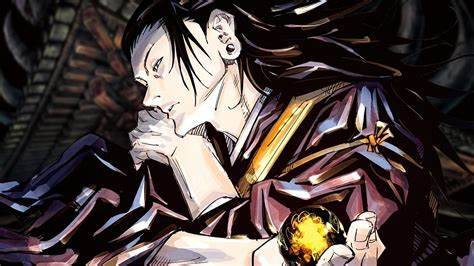
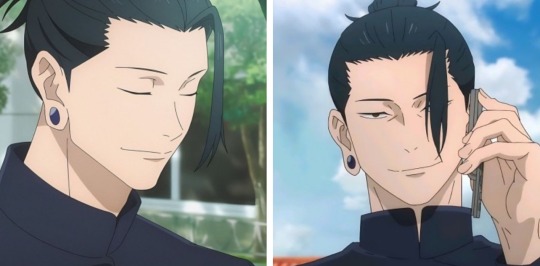
Gege has made several writing choices to depict Geto as someone who was handsome and loved - arguably more than any other character in the series. Maybe Gege loves him the most - not complaining at all.
More under the cut - just a few visuals I’ve collected to demonstrate this. I’m certainly not alone in noticing it and there may be others who show this much better, lol. Tag me in if you want to share!!
My post does end with a not-so brief analysis which you can skip if you wish.
Geto, despite being cursed at birth with the technique to absorb the ills of the world, the very skill that led him to fight alongside Gojo as part of the Strongest Duo - by design, each others’ counterpart in so many ways - a twist of fate led them onto opposite paths, leading to complete imbalance, one that drove him into madness.
If Geto in some ways represented Love, it is truly the most twisted curse of all which played a part in his death.
Geto witnessed the most love confessions in the whole series - I found (and stole) it off twitter/now X:
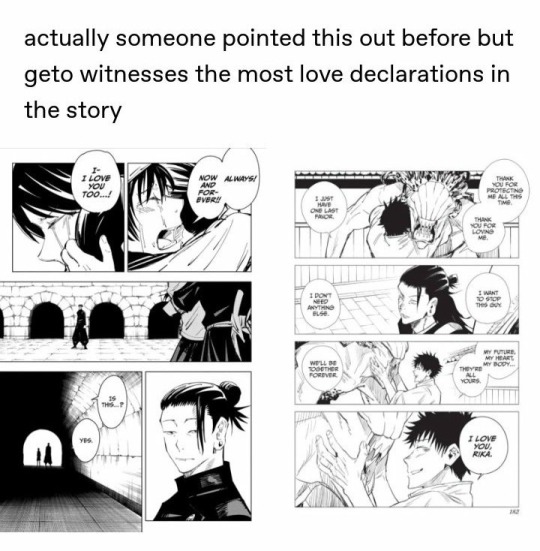
The Japanese originals seem more compelling to me:
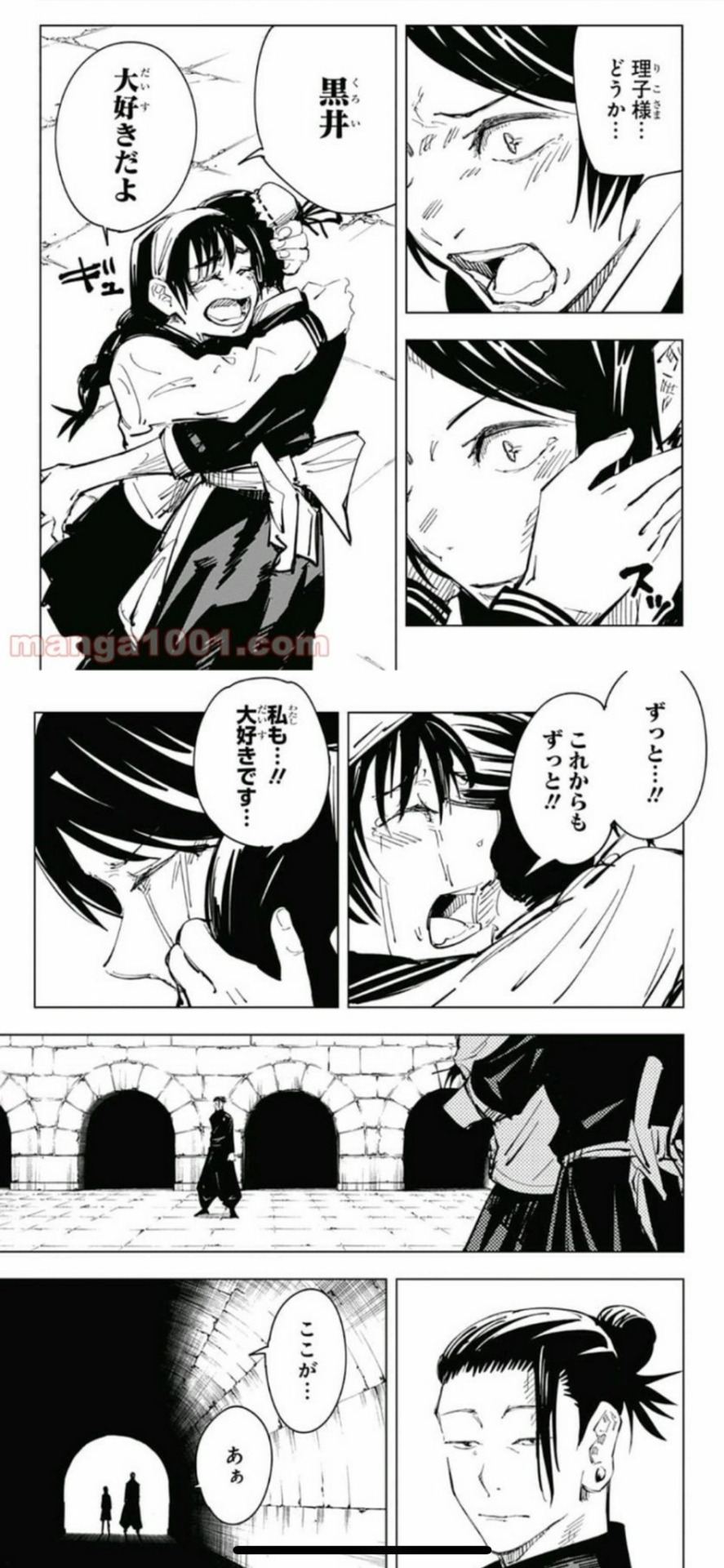
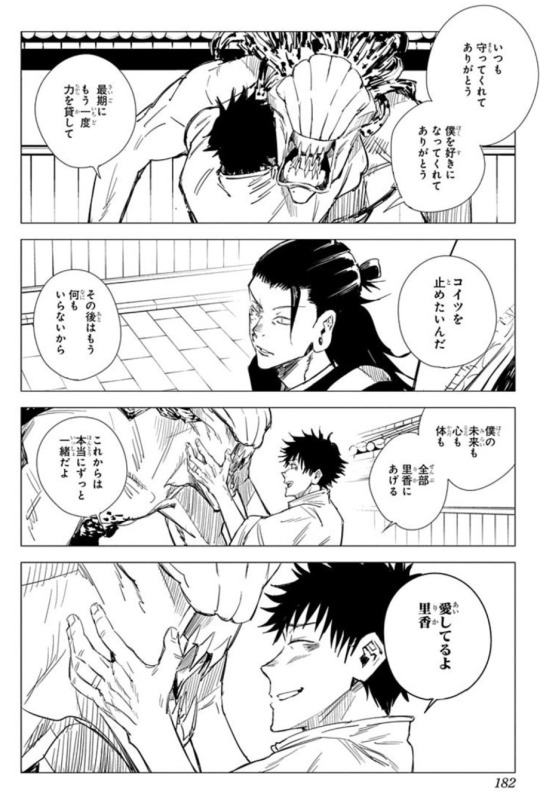
Riko says “daisuki” whereas Yuta uses a more traditional “Aishiteru” which, is quite embarrassing of a confession, and therefore almost hints at what could be Gojo’s last words to Geto, if it directly parallels Yuta & Rika’s relationship. And that expression Geto wears when he sees Riko and Kuroi struggle with separating?
That does not look like a person who cannot sympathise and empathise with people. Geto was a person who cared too much, and in search for a way to protect those he cared for, needed an outlet and something (in this case, lesser being, the humans) to blame. He descended into a mania and much like shinobu sensui from yu yu hakusho, seemed to develop some kind of mental disorder due to being unable to carry the conflicting ideals together. The dissonance the world presented to him was just too cruel, and he himself became a weapon to defend his ideals.
Before his defection, Geto was liked by his peers:
Haibara
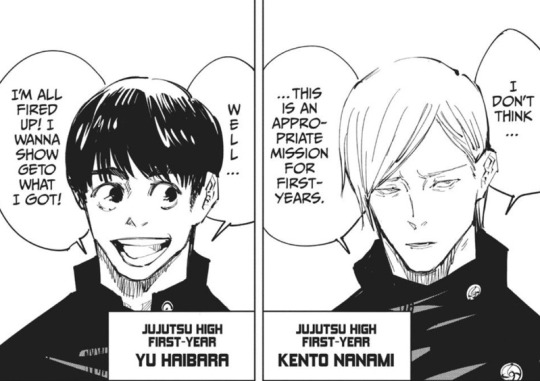
Mei Mei
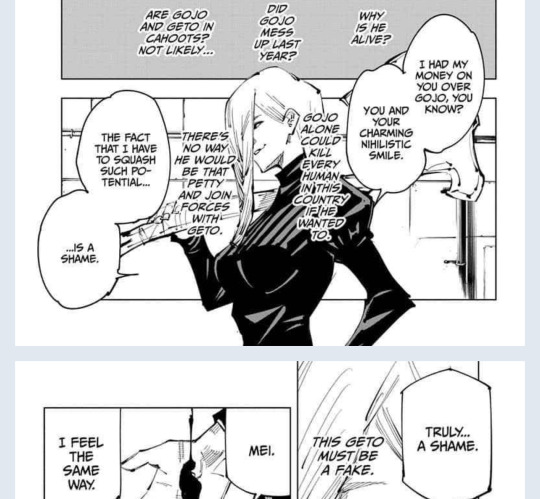
Loved by his family for and despite his ideals:
Mimiko and Nanako
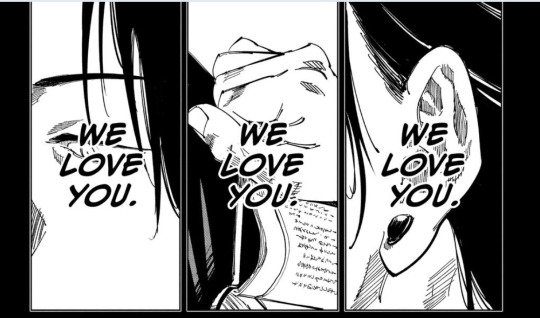
Shibuya crew liked/loved him and carried his will/beliefs even after his death, in their own ways, as family:
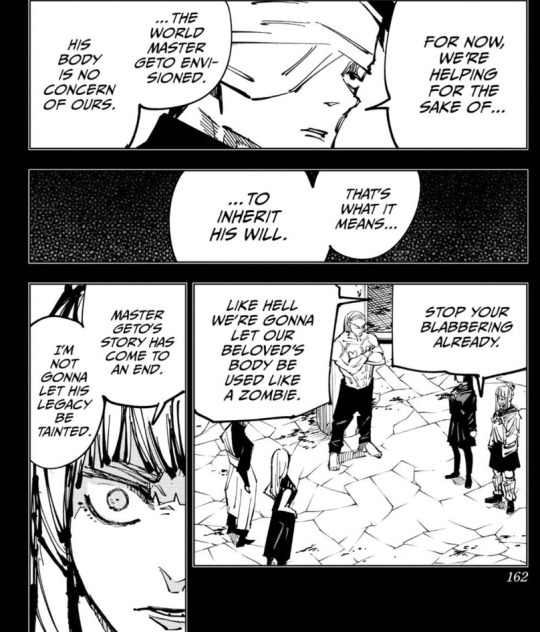
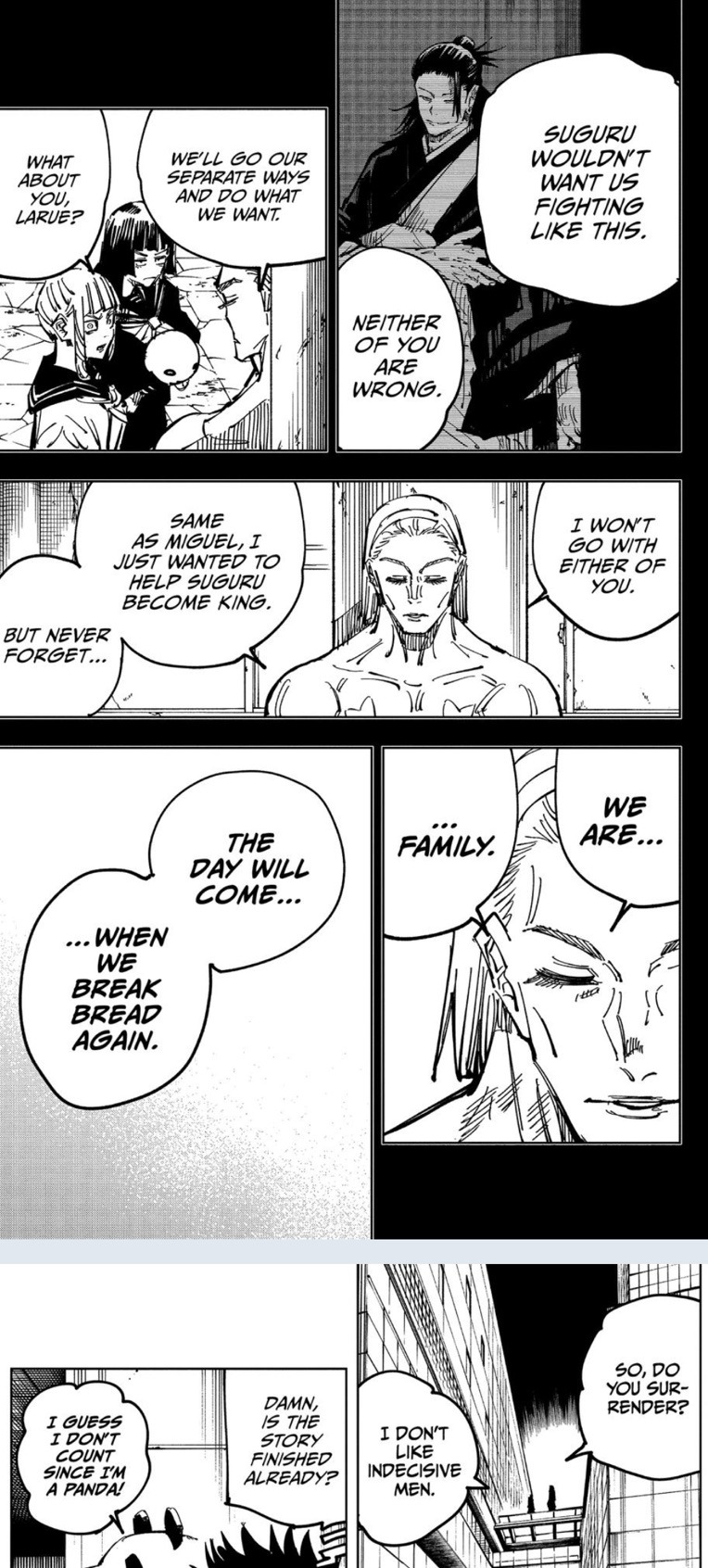
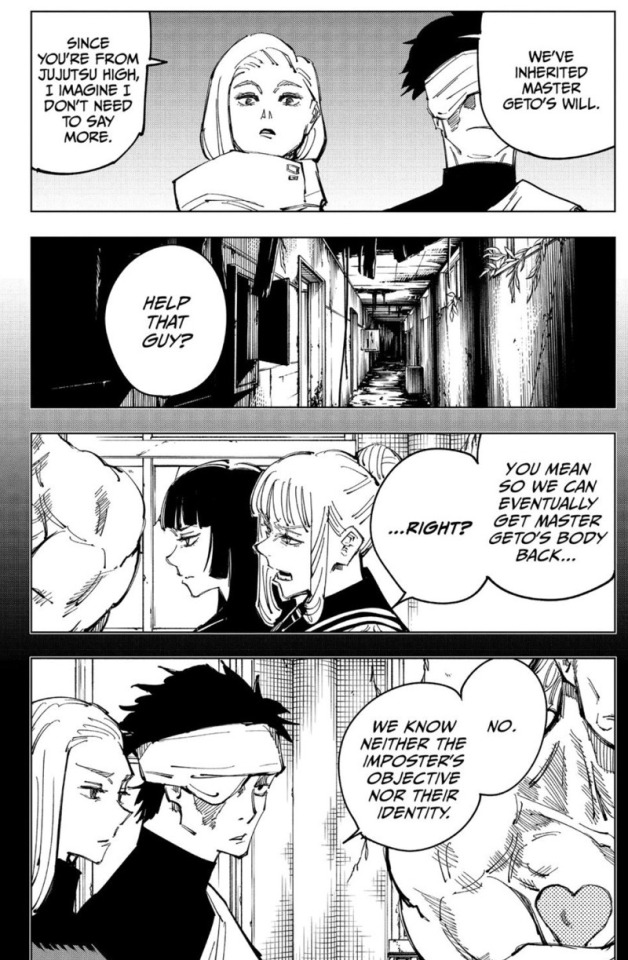
Miguel and Larue in the most recent chapter to date:
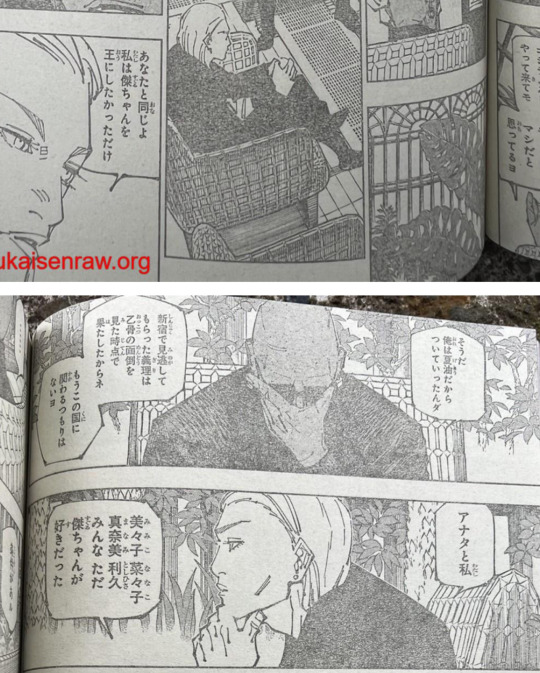
Translations (rough):
Larue: You and me alike, we just wanted Suguru-chan to be King.
Miguel: Yea, I followed just because it was Geto. After shibuya, I trained Okkotsu and I don’t want anything to do with the country anymore. (Something along these lines; a little too complicated for my rudimentary Japanese)
Larue: You , me, Mimiko, Nanako, Manami, Toshihisa, everyone just really liked/loved Suguru-chan.
Canonically, he was known to be handsome and popular:
Takaba
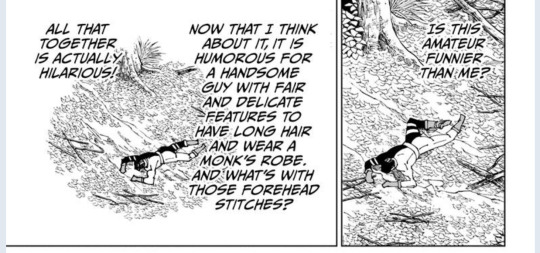
Gege’s character book:
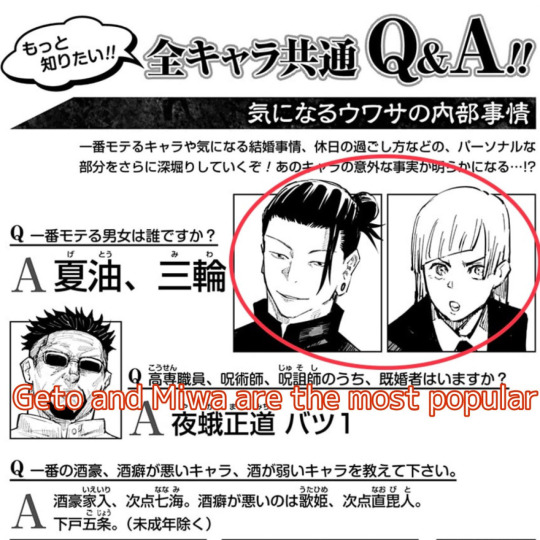
JJK popularity poll:
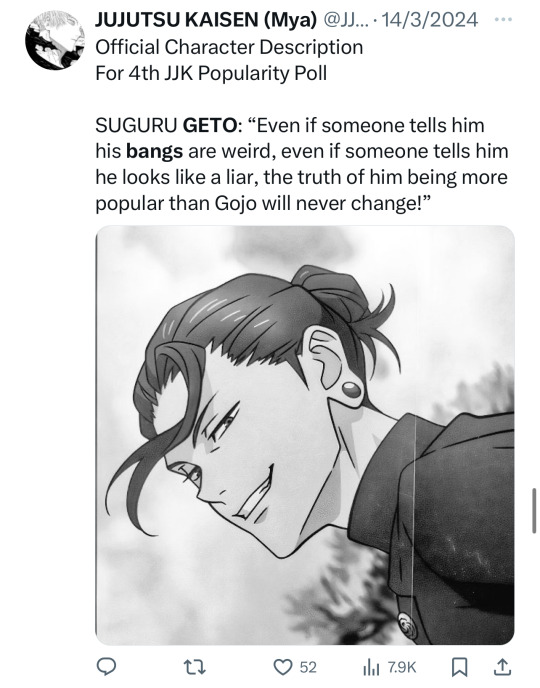
I do not have screengrabs of how Manami and Larue joined, but it was said to be due to how handsome they thought he was.
Maybe he was like Rika, who did realise how she came across in her life, and manipulated people, lol. But that’s a bit of a stretch to bring that parallel/similarity in. Geto was just quite a magnetic person, according to Gege.
And in the most roundabout way:
Gojo:
“my one and only”
“Love is the most twisted curse...” “curse me a little at the end.”

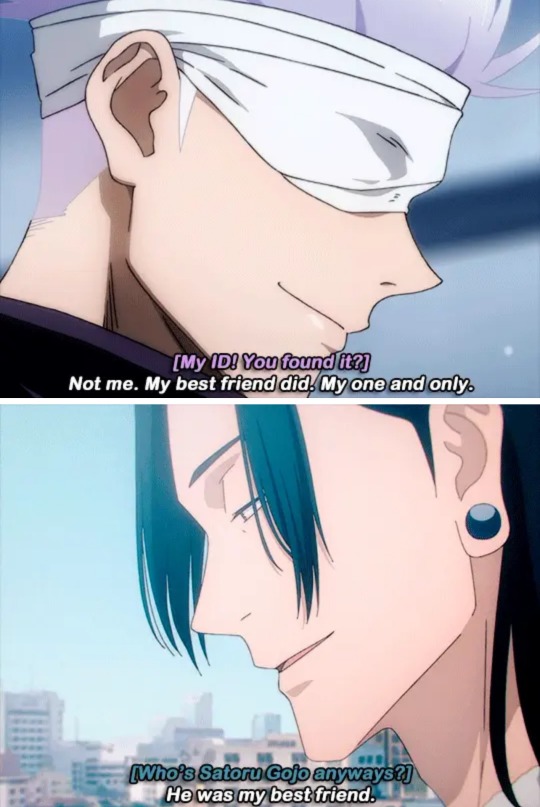
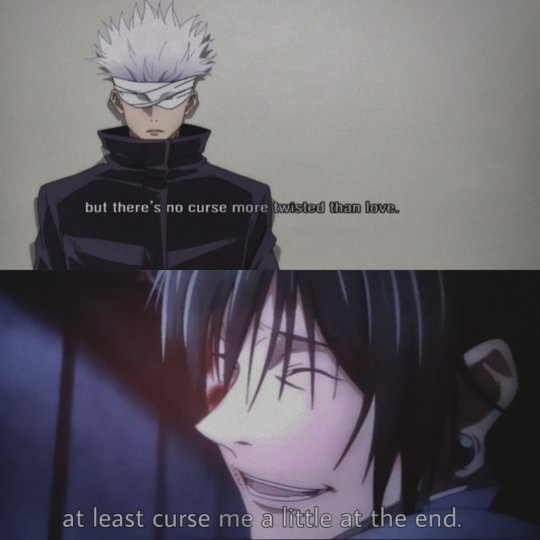
“I don’t need love to satisfy me” ... “if you were there I might’ve have been satisfied”
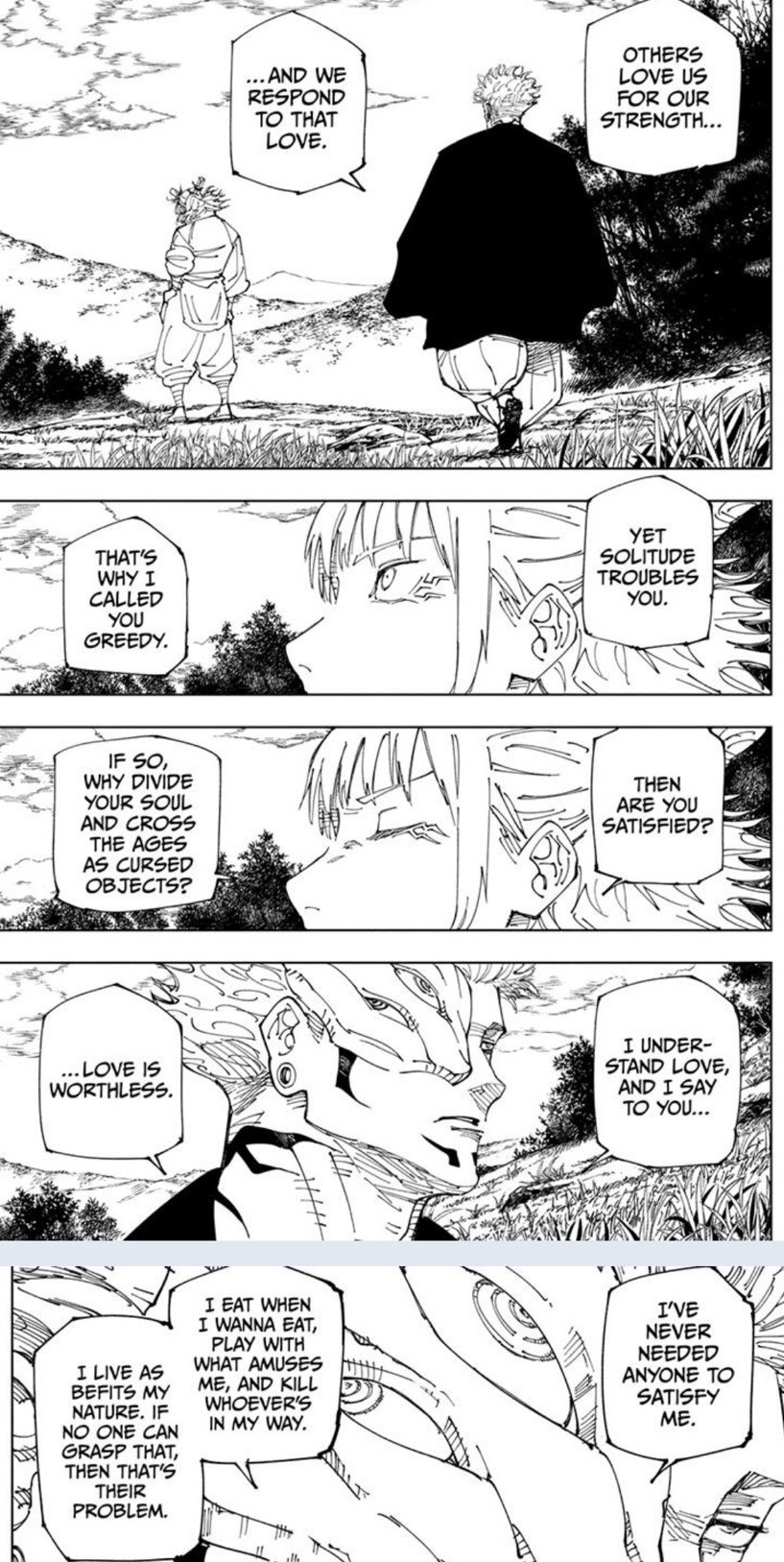
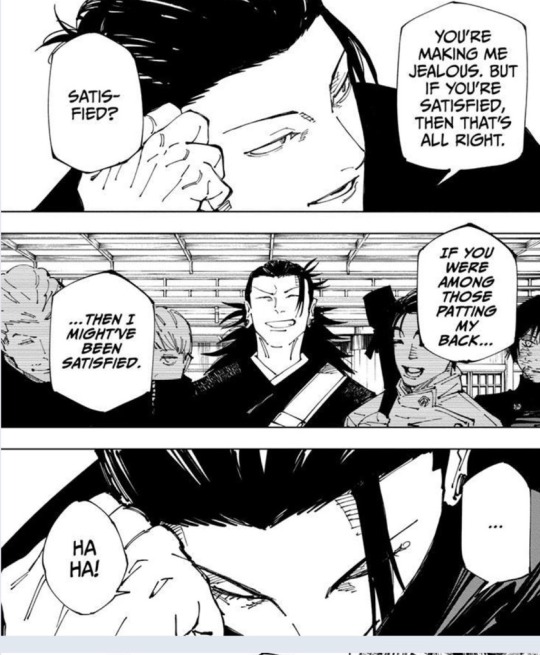
While love surrounds Geto, the theme that follows Gojo appears to be “the strongest” cursed; he was admired, revered, feared, and disliked by many. It truly breaks my heart, to think of what he had to give up to carry the weight of this for his whole life, until the very end.
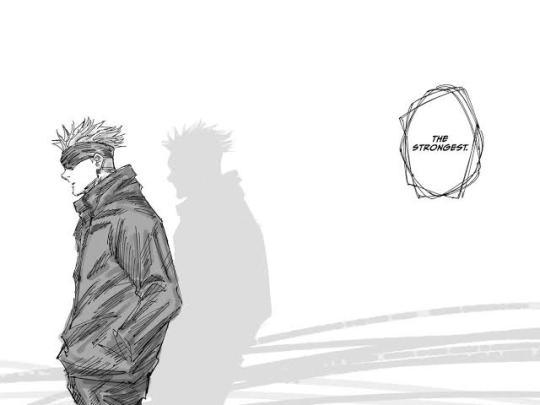
This looks like the most dizzyingly lonely picture of Gojo. It was indeed ironic to have it all but to embody what it means to have an unlimited void by being totally different.
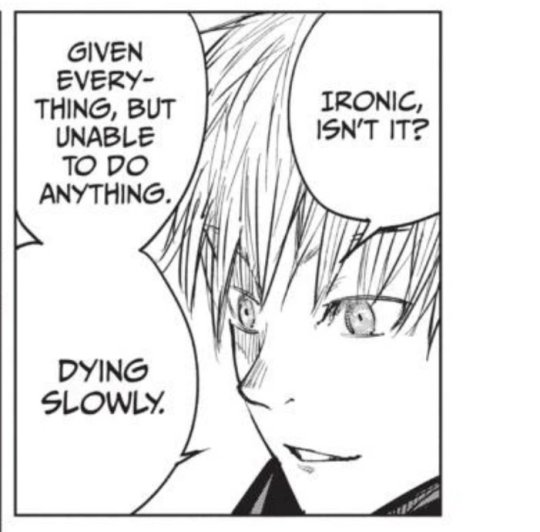
He suffered so much for his power and to have carried this strength. The sorcerer world was practically on his shoulders. The balance was up to him; everyone relied on him. Every time he tried to protect his love (geto) it seemed to fail. It worsened each time, ending with his own demise. But of course that’s just a dramatic interpretation - I don’t really mean/believe that, but it is one way to see the tragedy between Gojo and Geto. Strength at the expense of love; it plays out with the strongest this far as those identifying with this title are plagued by loneliness and do not know love.
They met before things got twisted within themselves, between them. Even after Geto left, Gojo seemed to be looking and waiting for him - to prove his trust for him almost as if he saw through his illusions and lies. Geto was the shadow (Yin) and Gojo was the light (Yang). Only the light can see through the dark. I’ll leave the gojo characterisation for another time / to other better writers.
For now, I’ll just say that I felt that he had planned for the possibility of losing to Sukuna (with the various things we see him do between scheduling the 24th and the actual day) and if he won, he’d just carry on the plan to cremate Geto on top of saving everyone and being a good example as the strongest. Worst case scenario, he would weaken Sukuna and I guess just die on the same day as Geto - idk, maybe as a form of redemption for one of his most painful experiences in life. Who knows?
I headcanon he was relieved to pass on, doing his part to defend the world that relied on him so much, with a big bang - a really fun fight.
And I’m glad they found each other at the end - the loved and the lost.
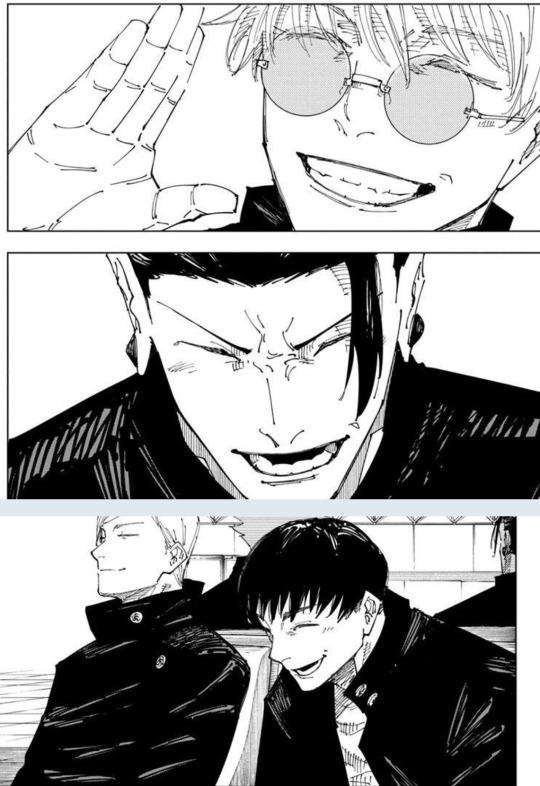
Back to Geto:
We don’t get much insight into what Geto wanted or felt aside from a world that was better for sorcerers, those he cared about. Even at the afterlife scene, or in subsequent chapters, we only hear from others rather than Geto.
Call me biased and delusional; I believe he didn’t kill the innocent despite saying he hated them all. He loved and hurt so strongly that he hated with almost equal force. He did want to force evolution and eventually extinguish all human kind, to him: the ignorant source of suffering, but I’m glad he didn’t manage to get Rika. I headcanon that he was aware he was losing himself by defying his own principles (to kill sorcerers) for his own gain. That, and Rika with a binding vow for a life, no less, was just too powerful.
In the official character book, Geto was described as someone who told himself that he hated humans a lot, like a reminder. He didn’t kill people indiscriminately. I’m sure he was well aware of how evil he had become but he had chosen, hadn’t he? He expressed to Yuta, that self-affirmation was incredibly important in his view. And the more he interacted with the students, I think the more his humanity fought back - I mean, he was standing there crying from being so moved by what he saw. He also let Yuta heal his friends. How villainous? Or how incredibly loving in spite of himself?
Geto has been shown to lie to others too: jjk 0: described having lied to the school about the conditions for obtaining a cursed spirit, and after defecting: upon taking stage for the first time, stating that the looking the part (wearing gojokesa) was important (ie lying). At his death’s door, he also prefaces with, no matter what anyone says - why would there be a need for that if he wasn’t telling a half-truth? He sought to avenge Riko (first person at the cult he killed after calling him onto the stage + cue mic throw) and the village represented a bunch of people who he slaughtered out of rage and ignorance. I’m definitely not defending him here - his actions are reprehensible. My headcanon view is that he didn’t know how to live with himself after snapping and that was the only path laid before him, which he ardently committed to.
I just think that he held onto a form of love/humanity still- Gojo and Geto both did. Without it, Geto would’ve become the Queen of curses due to Rika (uncaring about his family, or killing young sorcerors despite witnessing the students’ bond and yuta’s selfless power of love in jjk0) and Gojo may have focused on training at all cost without embracing Geto’s principles and becoming a teacher to change the jujutsu world - he could’ve become the next Sukuna and take the title of the King of curses instead - crowning them both King and Queen - instead of both the King and Queen contributing to their deaths. Anyway, I digress...
Geto appears very mother-coded in his protective and defensive relations to the girls, but also to Riko, Kuroi, and Gojo - especially after Toji had killed them. He was so fiercely trying to avenge and defend them, but failing that had a huge effect on him. Moreover, Haibara - innocent, glowingly positive - suffered an undeserved death. It weighed so heavily on Geto, that he didn’t defend Gojo when Nanami vented about leaving things to Gojo who seemed to take it all in his stride, almost insinuating that Geto, too, had little autonomy but to carry on that cycle of curse consumption he began to loathe.
Yuki also underlined the meaninglessness of the death / sacrifice / relationship rupture / suffering. And like the novel implies: Geto was too sincere for this world. He just loved too deeply and wounds cut him too painfully. At just 17... what inner resources were they forced to develop?
He was disillusioned by the system, but respected that Gojo had a place there. This is also SatoSugu indulgent: He never once attempted to talk Gojo into joining him, despite it being the most logical choice, but Geto was the emotional and loving kind - he prioritised Gojo over his ideals / himself. This man was willing to die trying to pursue his ideals, but didn’t want to try convincing his friend even if he know it might fail. What does that say about him? I think it says he loved Gojo. And Gojo loved him.
He masked like Gojo did : the infamous “yeah I’d win” and Geto’s “I’ve made my choice” and his face fell as he had his back turned, stating that he just needed to do it to the best of his ability. This may be headcanon but it does seem plausible to me. He was under no illusions about what he had done. To love was to turn away too. To love was to let the other go. Sigh.
Backtracking a bit: When Geto encountered the twin girls, who knows what entered his mind, but there was something that emerged from being horrified, enraged, and it gave birth to new meaning. He would take control and save them - from humans and the institution that made child sorcerors die. According to Gege, he became Papa Geto. (Kenjaku is also mum-coded but the antithesis of motherly love, with the womb protrusion domain and actually bearing children.)
This is of course not limited to feminine energy, as parents, both male and female, have protective instincts. But I’m not here to go into that discourse. Just stereotypically, and loosely speaking, Geto is very Yin energy. He is a big Mama Bear. With extreme maternal aggression. We see female counterparts do this in the wild more than males. And yes, of course both male and female are protective. Both geto and gojo were protective in their own unique ways. That’s for another post. Geto would rather die than have anyone come save him. In fact, the scripture behind him in the temple goes somewhere along the lines of “death to the weak”. If he had failed, he deserved to die. His family should live.
Gojo cares for others differently. And yes we know he died whilst defending others too. He is inherently more individualistic due to what he is with his gifts and noble heritage. He is less emotional and more cerebral, the only time we saw him lose his composure was due to Geto.
He allows his students to take risks and would allow them to fight in his stead, like in jjk 0 where Toge and panda were sent to be defeated by Geto. Tough love, as Gojo admits. This is also very Dad-like in the modern sense of the word.
In my subjective experiencing of the world, it’s almost like a husband who is only really emotionally vulnerable with his wife, and is otherwise the successful businessman, dad, and whatever else he is. Geto is much like a mum that he would walk away from her husband (lol, Gojo in this case) in order to protect them in a way she deems is best. Maybe I’m a little nuts, I don’t know. (Actually I am a little eccentric, but that’s by the by).
Now this is totally just satosugu indulgent: I headcanon that Gojo also “protected” / was possessive of Geto by making a deal with Miguel since the latter said he would curse Geto if he died, lol. Especially in light of the latest chapter where Miguel said he was spared by Gojo. (And i reckon Gojo was respectful of Miguel being Geto’s family, so he spared him for that reason too). I mean, Gojo had to kill his best friend, but this was his burden to bear, you know? It’s almost sickeningly intimate to allow someone to end your suffering, and be entrusted with that too. Ugh, ouch, my heart…..
Edit: I’m reminded of that scene where Shoko reflects on loving neither of them, like Gojo, Geto didn’t want anyone to be alone anymore either. Geto said he didn’t feel happy from the bottom of his heart. Gojo felt lonely (although he said it got better at the airport scene). They weren’t alone, but probably felt it… because of the absence of their true/first love? Larue stating in the panels above that Geto wouldn’t wish for them to fight seems like a nod to what Geto believed happened between him and Gojo. Gojo raised allies - be strong, don’t be left behind. Geto a family - get along, don’t fight. Just pointing out what my take is on the parallels I’ve observed.
That ends the brief analysis portion of what I wished to convey about what appears to surround Geto. He may not have been depicted much in the series, but his presence has been felt through the eyes of many. It made me wonder why did Gege do this?
This author deliberately wrote multiple people in the verse to love and follow him (and spare him a death sentence for 10 years) despite not agreeing to his ideals.
Perhaps it isn’t Gege’s focus, understandably, to give us a lot more insight from Geto’s pov, but there is certainly some kind of narrative he is pushing to depict how this man, cruel yet kind, is somehow one of the few he seems to portray in this way more than others within the sorcerer world at the very least. That his life was somehow a tragedy that he might not have really known the love at all? I wonder what Gojo’s last words were to incite such a heartfelt reaction - well done? Welcome home? You did well? I love you? My one and only best friend? Sigh, I guess it’s a secret between them.
There are others who have written metas on Gojo and maternal energy. If I find it I’ll link it! Otherwise, search through my reblogs! So many fantastic writers and thinkers out there!
Thanks for reading if you made it this far!
#satosugu#stsg#jjk analysis#jujutsu kaisen#jjk meta#jjk spoilers#geto suguru#jjk#gojo satoru#jjk satosugu#jjk theories#jujutsu kaisen meta#jujutsu kaisen geto suguru#jujutsu kaisen theories#gege akutami#geto meta#satosugu angst#suguru meta#jujutsu kaisen suguru#jujutsu kaisen geto#jjk miguel#jjk stsg#stsg angst#satosugu analysis#jjk character analysis#satosugu theories#jjk manga#jjk anime
284 notes
·
View notes
Text
A Look into Mental Health: Jujutsu Kaisen Analysis
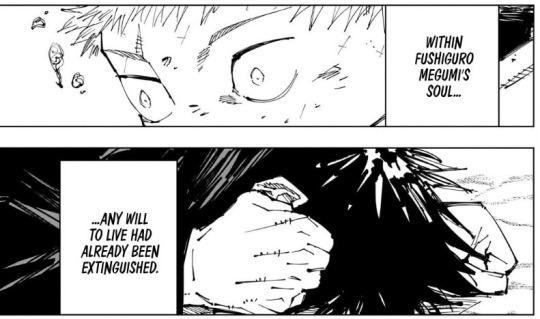
"Being a child is not a sin." (Nanami Kento, Jujutsu Kaisen)
With the release of Chapter 251, I've seen many horrible takes from dudebros saying that Megumi has "sold" the team. This makes me unreasonably angry because of course it does, so obviously my next plan of action is to take all of my hour-long rants about the mental health of JJK characters and put it here, where said dudebros will never see my (correct) analysis in their entire life. Oh well.
One thing Gege is really, really good at is creating believable, undeniably human, and complex characters. Every character has a different set of motivations, beliefs, ideals, and especially mental states. The constant theme of Jujutsu Kiasen has been "Strength vs Weakness". While the clearest interpretation can be seen through the physical attributes of the characters (Gojo being the strongest sorcerer of his time due to his abilities, and Miwa being one of the weakest, again, due to her abilities), it is also directly applied to the mental strength of characters. No two characters are able to withstand the same trauma and come out the exact same, just as no two real people can process the same trauma. Not only is it a result of nature, as people are genetically different and therefore process information differently, but a product of nurture - in other words, character motivation and environment.
This is where we come to the current state of the manga, Chapter 251. The fated Yuuji vs Megumi debate. I keep seeing people wildly misunderstanding these two, and why it's so important that Megumi isn't standing up to fight, why he isn't able to handle his trauma, when Yuuji can.
Gege writes phenomenal characters. And I want to express just how well done they are, making Jujutsu Kaisen actually kind of deserve its popularity, because some people only care about power scaling. I'm going to touch on Megumi last, because understanding all of the other characters' makes his visible struggle that much more impactful.
1. Geto Suguru

I want to start this mental health analysis with Geto. He is the best representation of depression I've ever seen in Shonen. It doesn't take a hundred chapters to showcase a character's downfall. It doesn't take a hundred significant events to cause a character to break down. Gege shows the best, realistic mental breakdown using only a handful of chapters, and still makes it slow and painful.
Depression can start because of a big event, but it doesn't take more for it to worsen. Untreated, depression runs a vicious course that eats a person through slowly but effectively. It isn't one screaming session, hands clutched over the head and cursing God and the world. It's everything piled onto each other. It's coming to the end of that pile and realizing that nothing will ever change.
This is Geto Suguru's story. He has a big event: the fight with Toji and the failure to save Riko. But his mental health journey was fated to decline, even without the fight and failure. The root issue of his depression came from his ability: Cursed Spirit Manipulation. As long as he kept devouring the embodiment of every vile, human emotion, the more he would lose himself to that vileness. He wasn't changing anything; he couldn't help but continue to swim in negativity because that's all he could do.
Gege wasn't making a commentary on Geto's ability. He was talking about people, as they are, and how staying in a bad situation will not always make you stronger. It can, and most likely will, make you worse. A direct comparison to the sixteen-year-old Geto would be a sixteen-year-old at school, surrounded by people who bully and pick on them with harsh words. The kid will eventually consume all of that bullying, all of that negativity, into their being, because there is simply nowhere else to go. School is mandatory; they can't just leave. They eventually feel isolated, with all that vileness piled on. Even if they have friends, those people could never understand what it's like to put up with humiliation and cruelty day after day.
It's not rational to push away a support system, but who said human beings are always rational? People make mistakes. They don't make the right decisions. Geto didn't. He saw someone offer him a chance at change, a possible light at the top of his pile and twisted it to match his overwhelming negativity. He left and swore to destroy the world that made him the way he is, just as that bullied child may turn away from school and society in whatever form that may take.
I want to touch on the physical aspects of Geto's depression, too. I noted this in a previous analysis I did on him (his character is just that amazing, what can I say?), but Gege knew that the mind can't be affected alone. Geto was drawn with deep eyebags, a nod to an inability to sleep or needing to sleep all the time. Depression makes you tired all the time. Everything becomes difficult. He sits with his back hunched, resting his weight on his knees, like sitting upright is too hard. When someone speaks to him, he blinks and takes a second too long to look over or respond, like speaking takes too much energy. To me, it even looked like he was becoming thinner. It's extremely difficult to maintain a schedule of exercise and mealtimes when your mind is fighting an active war against itself.
Again, a beautiful representation of depression. Geto means a lot to me in this aspect.
2. Gojo Satoru
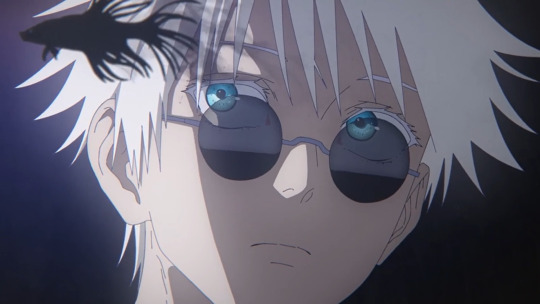
In comparison to Geto, Gojo's horrible mental health is a lot subtler. Depression isn't the correct term, but you don't have to be depressed to be sad. Sadness is his stagnant state; he has moments of bliss, goals to work towards, a reason to keep going, to continue living, to continue chasing the sun over the horizon, but he does return to the same place he is always at when the lights turn off and he's painfully reminded of this one fact: he is isolated.
All of Gojo's problems start and end with isolation. From the moment he was born, everyone knew he was different. He knew he was different. Through glimpses of his childhood and honestly reading between the lines, it's obvious he never played with kids his age. People don't just develop a superiority complex with their only drive to be better than literally everyone else for no other reason than to get better. It comes from somewhere, and in Gojo's case, it's from his young childhood. It seriously messed him up; even now, he can't shake the lesson that "Strength is the only way to success and happiness".
This is what made Geto so important. Geto was somebody who could share the burden of being the strongest. Geto was someone his age who understood him in a way Shoko could not, though they both were able to see Gojo beyond his capabilities as a Jujutsu sorcerer. Gojo then had somebody to base his moral principles on. Because he couldn't connect with anybody else, he had no basis other than strength. Geto taught him why it was important for the strong to protect the weak.
Then everything went wrong. Gojo became isolated again in his strength and lost the only person who could plausibly stand with him. "Are you the strongest because you're Gojo Satoru, or are you Gojo Satoru because you're the strongest?" Gojo was young, then, and fresh-faced into his newfound godhood. He didn't kill Geto in that moment because he wanted to deny the claim that he is nothing without his strength, that he isn't as shallow as he was raised to be.
But he knew better. He grew older, he killed his best friend, and he realized that he was nothing without his strength. He never got over Geto. In order to cope with the guilt of being unable to save him when he left, he adopted a whole kid, thinking that if he wasn't strong enough to save Geto, maybe he could save Megumi. But there it is all over again - he never broke from the cycle of strength defining his worth. Saving Megumi would define his strength, right? It would prove Geto wrong, right? He raised Megumi under the same logic (that the only way to save his sister is to be strong), only ridding the boy of the crushing isolation.
In this way, Gojo isn't mentally weak. He didn't abandon society and everyone who loved him, instead choosing to hone the trauma of his isolated childhood into a weapon and teach the next generation to be better than himself. He isn't depressed, but he isn't happy. You can't be happy if you're alone all of the time. He hoped Megumi could be someone to stand by him, but in the end, he failed to save Megumi. His strength couldn't save him, just as it couldn't save Geto.
He isn't mentally strong. He isn't weak, either. He is horribly, painfully average. He's not weak enough to be saved, but not strong enough to save others. His childhood plagues him, but not to the point where it prevents him from living. He killed Geto but was unable to bury the body. Gojo is everything he never wanted to be.
As it turns out, strength can't buy you happiness. Gojo may have understood that, but he couldn't abandon it, even to the bitter end. Just as a human struggles to shed their conditioning. Not everyone can break the cycle, but we are always trying our best to work with what we've been dealt.
3. Okkotsu Yuuta

I'm putting Yuuta in between Gojo & Geto and Itadori & Megumi because he is, in a way, a bridge between the two. Geto and Gojo have lived their lives; their stories are complete and ended in tragedy. Itadori and Megumi's are not. They are still actively struggling and fighting their physical and mental battles; their stories have yet to be completed.
Yuuta's story isn't technically completed (ignoring everything that happened in the recent chapter with him for the sake of MY mental health), he is still a success story. He is the average protagonist who started from the bottom and ended up at the top. Only he, as Gege has done time and time again, has a slightly stronger focus on mental health than most other Shonen. He is success where Gojo & Geto failed, and the success that Itadori & Megumi are narratively striving for.
At the beginning, Yuuta was depressed and suicidal. He was bullied at school and involuntarily hurting others. Instead of becoming resentful of the world, he pushed all of the vileness inward. His guilt caused him to try to take his life, presumably multiple times, but Rika stopped him before he could succeed. His life was effectively out of his hands; he felt powerless with all of the bodies stacking around him, and he couldn't atone for "his" actions.
His mental health, as it was, was in shambles. Gojo then offered him a way forward. Yuuta's mental health did not improve overnight. It was when he made friends at Jujutsu High, and developed a support system, that he was able to relieve his anxiety and realize that life is not so bad after all. That all of this pain and suffering and loss - it will pass.
The most important thing to acknowledge when it comes to Yuuta is the sheer fact that he was not alone, nor did he allow himself to be alone. Unlike Gojo, who still had Shoko and Nanami after Geto left but refused to connect with them, Yuuta allowed himself to get close to those around him. They didn't know the suffering he'd undergone for so many years. They didn't know what it was like to be him, but that was okay. He knew that they had empathy, that even though they could never experience his life, they could still be there for him now when he falls.
When given the opportunity to surrender, Yuuta stands in the face of one Geto Suguru and swears to protect his friends and fight with Rika. He's so far removed from the boy who tried to kill himself at the beginning of the manga, and that's because he let himself be changed. He did not succumb. He had friends, he knew. People that would miss him if he left, and people whom he would regret leaving.
This stays consistent with his character. He doesn't let himself become isolated in his strength or his experiences. He's much stronger than everyone else in the room, he's a special grade and he knows that, but he still treats everyone like they are equals. Like they are his friends, like they are people who could share this burden of existence with him. This is something that Gojo couldn't accomplish, which lends to the fact that Gojo had a very off-hand teaching method when it came to mentoring Yuuta. Instead of influencing him under this idea of strength conquers all, he let Yuuta develop far away from the ideals of the Japanese Jujutsu Society.
And, in the end, the fact of him being physically strong - a special-grade sorcerer from the get-go - never helped him in his mental health. In fact, it made him miserable until he learned to get a handle on Rika. His winning or losing that fight with Geto wasn't the point of his character, it was reckoning with the fact that he is okay now. That he can embrace the ugly part of him with dignity instead of guilt.
4. Itadori Yuuji
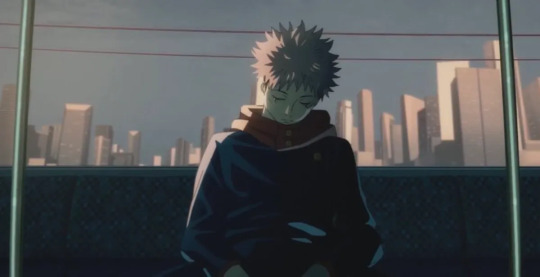
Itadori's entire character is that he has an unbreakable spirit. As the only one who can bear the soul of Sukuna, he started off like Yuuta, only on the opposite end of the mental health spectrum. When we first see him, he's happy, spending his afternoons with the Occult Club and watching movies.
... What happened?
Like Geto, everything piled on very slowly. So slow that I'm not even sure he felt the true effects of everything he experienced up until the fall of Shibuya. It starts with the death of grandfather, whose parting words "Just save as many people as you can" haunt him even now during the final fight with Sukuna. He was never given time to properly grieve his grandfather, just as he never had time to grieve the brother curses, Junpei, Nanami, Nobara, Gojo, Higurama. At the end of it all, when the fighting is over, I have to wonder what will become of the boy that realizes he's lost most of the people he loved.
The one time he did try to process it, when he realized that he couldn't control Sukuna, was when he broke down in Shibuya. Sukuna leveled an entire city. For the boy who never wanted to kill another human being for fear of devaluing life, the weight of his weakness killing thousands was crushing. Then Nanami died. Nobara died (still hanging onto that unknown status but I digress). Both are right in front of him, and powerless to prevent Mahito from disintegrating their bodies. So, obviously, Itadori broke down. The boy with the unshakeable spirit, the only person who could contain the King of Curses, has his psyche completely shattered.
He laid on the ground, and he wouldn't have gotten back up if there wasn't somebody to help him, to be there with him. Todo pulled him back together, stitched back up the broken into somebody who has allies and people to fight for. Itadori has the success that Yuuta had, only Itadori did not come out of it with better mental health.
After the breakdown, his unshakeable spirit was nothing more than the will to keep fighting. He cares little for himself, and he tries to distance himself from people to prevent them from dying from his cursed hands. He is jumping, quickly, down the same rabbit hole that Geto fell down. One big event, and they realize just how tall the pile already is, and that it will never stop growing. Unlike Geto, however, he continues to get overbearing support from those around him. Against his will. He can't push them away, for they refuse to leave his side. Yuuta, Choso, Megumi, even Higurama. They won't let him fall. This makes him better off than someone alone, in a sense. He can withstand his trauma when others may not.
Even so, even so, there is only so much support, the lack of self-isolation, can do when the traumas keep actively repeating. When he says that he will gladly die to defeat Sukuna, it is not said with the same tone that another Shonen protagonist would say it. Take Naruto for example. If he were to go into a battle to protect, say, Sasuke, he would scream, "I'll die to protect him." We understand that his willpower is stronger than his self-preservation, but we don't get the idea that he actively wants to die. He'll die if he has to. Now, Itadori says the same thing, but about saving Megumi. He says, "I'll gladly die." There is something different. His willpower is leaps and bounds stronger than his self-preservation, but that's not only it. There is an undercurrent of severe suicidal ideation prevalent in Itadori's tone. It's not that he will die to win, it's that a part of him wants for this to be his final fight. For it all to be over. To save Megumi, then atone for the sin of being too weak to save Shibuya, or being unable to stop the Culling Games, or letting Megumi get hurt when all he wanted was to keep him safe.
I'd call it more along the lines of passive suicidal ideation. He doesn't plan to kill himself, but what would it mean for him to go into dangerous situations without protection? What would it mean for him to succumb to his wounds after he wakes Megumi's soul and kills Sukuna? To not even try to seek medical attention? He's guilty. He believes everything that happened in Shibuya and after is his fault. When faced with the executioner's sword, he was ready to die for his sins, if not for the goal of ending the Games. There is a fine line between willing to die for those you love versus wanting to die for those you love.
Right now, Itadori is fighting to save one person, like his grandfather said. He is not fighting to survive. And that's what people fail to understand about Itadori when they compare him to the other members of the cast. These power-scaling dudebros don't understand that their favorite OP main character has fallen apart at the seams, that his unshakeable spirit to save people doesn't include himself.
5. Fushiguro Megumi
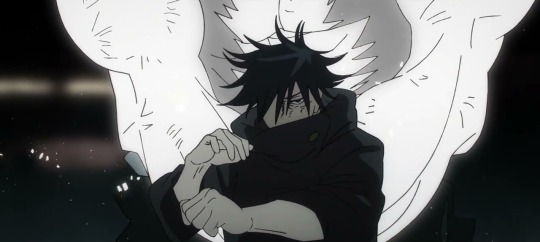
Here we finally come to the question: Why can Itadori take it when Megumi can't? There is a very similar quote that you probably think of whenever you hear this question asked. It's from The Outsiders: "Dally is tougher than I am. Why can I take it when Dally can't?" The answer to this question that Ponyboy gives is the same we can attribute to Megumi. "And then I knew. Johnny was the only thing Dally loved. And now Johnny was gone."
The entire reason Megumi became a Jujutsu sorcerer was to protect his sister. When he was five years old and probably too young to understand most of the words Gojo said, he accepted the offer of training to become a sorcerer in exchange for Tsumiki's happiness. Every day, he fought to protect her. He only had one goal in entering the Culling Games: to prevent Tsumiki from having to participate.
It's easy to attribute Megumi's constant attempts at summoning Mahoraga to a lack of will to live - suicidal ideation, the same that Itadori now experiences. On one hand, I do understand that he has a fundamental lack of care for his own life, but on the other, I don't think that he intends to throw it all away every single time. He just didn't know any better. Ignorance can lead to death as easily as intentionally seeking it out. That's why he changes his habit after Gojo gives him a lesson in risking death versus dying to win; Megumi still has someone to live for, after all.
Megumi's mental health was already rocky from the start. Not that it was in shambles like Yuuta, but he wasn't fully stable. Like a lot of teenagers, he's moody, somewhat reclusive, and only really likes one or two people maximum. Teenagers aren't known for their sunshine mental health anyway.
Megumi was given time to grieve Itadori after he first died. This trauma of losing him in front of his eyes stuck with him, but he was allowed a grace period of two months to grieve with Nobara. He experienced Shibuya, too, but he still had that one important person to protect. His mental health was alright at this point, all things considered. As long as his sister was alive, he would be fine.
Sukuna knew this. So Sukuna killed Tsumiki using only the Ten Shadows Teqchnique. The one person Megumi spent his whole life dedicated to, was killed by his own cursed technique, his own failure to suppress Sukuna.
In the void of his soul, Megumi was alone. Truly, utterly alone. The only person nearby was Sukuna, the murderer of his sister, the murderer of thousands upon thousands of people. He drowned in the ceremonial bath of crushed curses to hold his soul down in the depths of despair, literally drenched in all of the vileness the world has to offer. Sukuna killed Gojo using Mahoraga's adaption ability, and before that, Megumi was forced to take several of Gojo's mind-altering domain expansions.
Already, he had given up. He gave up when his sister died, but the rest ground a pointed spur into his neck. When Itadori shakes his soul, Megumi is repeating, "That's enough." He was at the end of his rope a long time ago. What more is there to keep living for? He doesn't want to live with the blood of his sister, the blood of the man who practically raised him, and the blood of countless others drenching his hands.
Sukuna killed all of these people, not Megumi. But then, Sukuna killed of those people in Shibuya, not Itadori. Why can Itadori take it? Why can he keep fighting when Megumi lays broken on the ground? Itadori wasn't alone. And Megumi has never been known for his unshakeable spirit. That is the one thing that Itadori can hold over everybody else, the one trait that everyone admires. He was born to shoulder the burden of the world. Megumi wasn't. Megumi wants to die. He is not passively suicidal, for he has no goals left to complete, a plan to die within the body no longer inhabited alone. He is suicidal. He would drive a stake through his heart if it meant relieving his pain. He doesn't want to do it anymore. He's had enough.
And Itadori was in this position once, too? Perhaps not as directly, but he was there. Here is the moment that the protagonist gives the motivating speech to will someone to keep fighting, that life is worth living. I realized today that this is not something Itadori has done yet. He hasn't had a grand speech that's not been about his own willpower. He's never encouraged someone else to keep living in the way that you would expect from the main character. This is his moment, I suppose. He needs to be the person for Megumi that Todo was for him. He has to show Megumi that he isn't alone.
He needs to save Megumi when, all those years ago, Gojo couldn't save Geto.
I don't think some of this fanbase understands how horrible Gege has to be at writing if he just. Let Megumi get up to fight in Chapter 251. All this time, he has shown how Megumi has been defeated. He showed him crumbled on the ground, unmoving. It shouldn't be a surprise that all of the measures Sukuna took to ensnare Megumi's soul worked. Megumi is suicidal after the people he loves have all died because of his technique. God forbid a sixteen-year-old is unable to cope with his trauma alone.
Honorable Mentions:
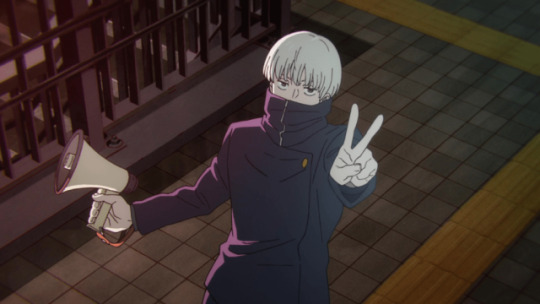
There are a lot more characters in this story that represent/show mental illness that I didn't go into depth on but are worth mentioning. It was easier to only talk about the major characters since we spend so much time with them and I can fully flesh out everything that should/can be said about them. Anyway, here are a few more that are notably well-written in their mental struggles:
Yoshino Junpei. His story arc follows very similarly to Geto, except he is the bullied student I was making a reference to. Depressed, alone with a mother whose habits he can't stand, he turned to someone he thought could provide him a better life. Interestingly, he is a good representation of the type of children that tend to be groomed. That's surely what happened to him. Mahito used him, then discarded him for his own gains.
Ieiri Shoko. Her main struggle can be seen through her smoking habits. She's been through a lot, lost so many people, and has to keep healing sorcerers only for them to die. Eventually, she was able to come to terms with this. She kicked her smoking habit at the same time she kicked the vicious mental cycle of caring too much about the patient on her table. It's no wonder she picked up a cigarette, for the first time in a while, when Geto led the phantom parade.
Zenin Maki. She works as a very good contrast to Megumi. They both lost their sisters, the people they loved the most, but she turned all of her grief to killing the Zenin clan and gaining Heavenly Restriction. But this, this is because she could do so. There is simply nothing Megumi can do as a soul trapped in his own body. Her grief made her stronger, while for most, it made them weaker.
Inumaki Toge. He isn't seen a lot, but his story is ultimately quite compelling. A boy who hurt many when he was young. He turned his guilt into kindness, a will to protect. He tends a garden to raise plants healthily, for God's sake. He's one of the examples that shows Yuuta that your past actions don't define you, but instead, what you choose to do going forward.
I am not proofreading any of this before I post it. Sorry if it is borderline unreadable with spelling / grammatical errors.
#jjk#jujutsu kaisen#jujutsu kaisen rant#jjk gojo#jjk geto#jjk yuuta#jjk itadori#jjk yuuji#jjk megumi#jjk fushiguro#jjk satoru#jjk suguru#jjk okkotsu#itafushi undertones i won't lie#but it's not about them sigh#friends or not everything still applies#jjk analysis#jujutsu kaisen analysis#jjk character analysis#jujutsu kaisen character analysis#jjk 251#jjk chapter 251#jujutsu kaisen 251
153 notes
·
View notes
Note
something I wanted to understand, the author said that satoru was quite a womanizer, but then he said that geto was much more popular among women than satoru I didn't understand
Technically, the author said that they didn't see Gojo being faithful to one or a certain woman not that he was a womanizer.
With what we know about Gojo (and Gege Akutami's trolling ways, for that matter), I think that's up for interpretation.
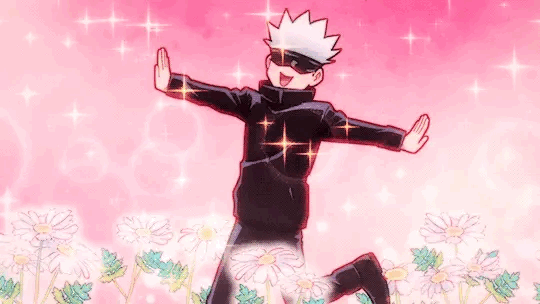
FAN INTERPRETATION
Fans really took that sentiment and kind of ran with it because, to us, Gojo is high spec in every way. Canonically good looking, tall, competent at like.. everything according to Akutami, strong and presumably loaded. Of course someone like that would be a womanizer, right?
Except Gojo is an oversized child who still kinda refers to Digimon in conversation and primarily hangs out with 16 year olds. People project a lot of their BS onto him because they can't imagine ticking all those boxes and not being an asshole. But he’s a corny dork who is seemingly impervious to the outright disdain of most of the people around him. IT’S COMICAL. Personally, I think this interpretation is incorrect, demonstrably.
The other side of the fandom is naturally like... well of course he couldn't stay faithful to one woman. He's been faithful to Geto for ten years! I think we know what camp I've pitched my tent in *gestures vaguely to the rest of my blog* Especially when you bear in mind that Gege Akutami specifically designed Gojo and Geto to be intrinsic complements of one another.
CANON
I'm not so SatoSugu addled (once the brain rot sets in, it's terminal) that I am unable to disclose the secret third way we can interpret this. Canonically, when we look at Gojo as a character... it almost makes sense to assume he's simply not interested in dating at all.
Empirically finds it hard to relate to others
Even when he does care for others, he's still emotionally shallow and aware of it
Gojo clan leader with all associated unpleasantries and responsibilities from a young age
Single benefactor to two children; assumes direct responsibility over two more by staving off their execution
First line of defense for all of jujutsu society
Has a grand design of toppling said jujutsu society
Has experienced devastating loss which informs the grand design of his life's mission and he's always plotting, even when it comes to the seemingly altruistic act of "adopting" the Fushiguro kids or pressing Yuta and Yuji to learn under his care. When you consider that context, it furthers the idea that he's pretty divorced from emotion. Like, he wants them to have a childhood but its still at the pleasure of his convenience and ultimate purpose.

LOOK at this gorgeous, gorgeous boy from pop layer art because I need it and, when I covet, you must also covet. Edit: I'd accidently copied the wrong link there! It's been fixed 💙
In universe, we've seen maybe two canonical couples: Yuta & Rika and Hakari & Kirara (to be animated). This supports the fact that Gege's not really concerned with injecting "romance" into the plot unnecessarily. Undeniably and supporting the SatoSugu agenda, however, is the fact that JJK 0 very much aligned Gojo & Geto with Yuta & Rika with the theme coming to a head in season 2 with Gojo's sealment. For clarity, I mean how love ultimately cursed Rika and Geto after death by Yuta's begging her not to leave and Gojo not properly disposing of Geto's body. Love turned Rika into a curse and allowed Kenjaku to swoop in on Geto.
GETO'S POPULARITY
Geto is, quite literally, popular with everyone in universe and that was before he became a cult leader... which also indicates a predilection for popularity, I guess? As a character, he is principled, thoughtful, gentle and strong. I think, collectively, we tend to toil over the fact that Gojo spent more time missing Geto than he actually knew him. But... that's the same for Shoko and Nanami. After Geto's defection, Nanami couldn't forsake him even if he morally couldn't approve of his actions. Over ten years later as the night parade of a hundred demons is set to take place, Yaga starts saying something along the lines of finally getting rid of the scourge that is Suguru Geto and Shoko makes it a point to leave. I think it's because, after everything, she still holds affection and pity for Geto and would rather not hear him being bad-mouthed for breaking under the pressure of things.
He was the best of them, after all.
#neon asks#anon asks#we are the strongest#stsg#satosugu#gojo#gojo satoru#satoru gojo#anime#manga#jjk#jujutsu kaisen#jjk meta#jjk character analysis#head canon#character analysis#anime analysis#gojo analysis#geto suguru#suguru geto#satosugu brainrot#jjk brainrot#jjk headcanons
130 notes
·
View notes
Text
associated songs (jjk) !

features: yuuji i. megumi f. nobara k. yuuta o. maki z. toge i. satoru g. suguru g. toji f. kento n. sukuna r. choso k.
contents: manga spoilers. some fanon because not everything has been revealed yet. song headcanons. character analysis. angst. tw because jjk lore is fucked up. strong language. megumi, yuuta, gojo, and geto favoritism. sukuna's part is a lot of reaching because we know nothing about his backstory. 3.4k words.

yuuji itadori is working for the knife by mitski. this song shows yuuji's change in character during the shibuya arc, how nothing goes his way any longer and his will is worn thin again and again. "i cry at the start of every movie, i guess'cause i wish i was making things too" this shows yuuji's passion to make a life for himself, to make something that will last in this world beyond death, his grandfather's dying wish. "i always knew the world moves on, i just didn't know it would go without me" with this we can see yuuji's desperation to catch up to people like megumi and nobara but the world passes him by over and over again (ex. cursed womb, junpei). "i start the day high and it ends so low 'cause i'm working for the knife" yuuji goes into everything with hope and positivity but it often ends up with him losing something or feeling some sort of grief, his heart is broken over and over again by jujutsu. "i always thought the choice was mine, and i was right, but i just chose wrong" this resembles yuuji's choice to absorb sukuna, something he thought ws his descision and only something he could do. but when sukuna merges with megumi he is forced to consider whether he made the right choice and he acknowledges that he is not the only one who can do such. "i start the day lying and end with the truth, that i'm dying for the knife".
megumi fushiguro is who are you, really by mikky ekko. this song shows megumi's evolution as a character from a quiet boy to a true sorcerer (see: domain expansion discovery, shibuya). "so you feel entitled to a sense of control, and make decisions you think are your own" with this we can see megumi's attitude of superiority towards yuuji at the beginning of the series, and his general attitude towards his peers until his development. he feels that due to his long running experience and power, along with his intelligence, that these people are below him. "you are a stranger here, why have you come?" with this we can see megumi's hesitance to trust anybody, especially new people. this applies later in shibuya where he is unwilling to trust the incarnated toji (at the time, the correct decision), which ends up with his father recognizing him and killing himself to avoid hurting his son any longer. "who, who are you really? and where are you going?" megumi really has no sense of self for a decent chunk before shibuya, he is kind of just there. he has a personality but he does not have a reason for being like all of his peers do, he does not know who he is or what he wishes to do, he's just doing it to do it. "i have nothing left to prove, 'cause i have nothing left to lose, see me bear my teeth for you" in this we can encapsulate his development when he discovers chimera shadow garden. it's messy and last ditch, he has nothing left to lose and no one to prove himself to so he throws t all on a desperate attempt to try to create something truly for anf of himself, it's as messy as it is true. and it is what sets the path to allow megumi to define himself.
nobara kugisaki is primadonna by marina and the diamonds. this song shows nobara's materialistic nature and her confident personality as well as her more complex backstory. "all i ever wanted was the world" with this we can show her past, when all she wants is to spend time with saori, which at the time is her entire world. "would you do anything for me? buy a big diamond ring for me?" with this we can see the more materialistic sides of her personality, which all come from her humble upbringing in that little town. "i know i've go a big ego, i really don't know why it's such a big deal though" this resembles nobara's more confident side, where she is really proud of who she is and often cannot understand why others are not (see: the situation between her and momo about mai). "fill the void with celluloid. take a picture, i'm with the boys" nobara hides her sadness by living it up, because she wants to be able to go to saori and tell her about all the amazing things she did. she doesn't want saori to feel bad for leaving her, she wants to find her and then they can have fun just like they did when they were children, fun in the way that they couldn't have back in that country town..
yuuta okkotsu is little dark age by mgmt. this song helps show yuuta's greif at rika's death and his transformation into a sorcerer. "the ruins of the day, painted with a scar" this represents how yuuta never truly got over rika's death, the scar being her curse, something that he carved but will never leave him.. "and the more i straighten out, the less i want to try" as yuuta goes through his life, rika wreaks havoc unintentionally, making him give up on ever living a normal life again: rather isolating himself in misery or straight up trying to kill himself instead. "oh-oh, forgiving who you are, for what you stand to gain" yuuta harnesses rika's power and temporarily is able to control her cruse in order to gain power when he needs it. but it is not whole and complete and is done quite selfishly, rika has not gotten peace yet. "just know that if you hide, it doesn't go away" yuuta tries to supress rika for so long rather than embracing her and this just ends up making things worse for him, even when he tries to hide her by channeling her power into a sword it is not anywhere near his peak after he releases rika from the curse in his fight against geto. "oh-oh, i grieve in stereo, the stereo sounds strange" in yuuta's grief he creates the curse that rika is. unintentionally he curses this little girl and keeps her soul with him for nearly a decade after death, blaming her the entire time when he was the one who chained her soul to himself. eventually she finds peace and is able to pass on, but yuuta will forever be left with this constant reminder of his dead, first love and it is the source of all of his power. to give up and move on would be to relinquish what gives him strength, so he's trapped in this loophole of grief to keep the flame of his strength alive, never able to give himself the closure he gave her.
maki zen'in is oh no by marina and the diamonds. this song shows maki's development and past almost seamlessly, it also shows her parallels with toji well. "don't need money, don't need fame, i just wanna make a change" this shows how maki is not a sorcerer for the money or regard, but to change things. she just wants to change the jujutsu world, specifically the zen'ins so that there can be a place for her and mai to be safe. "i know exactly what i want and who i want to be" maki does not question who she is and her goals despite constant shame and ridicule by her clan, and eventually her own sister, she stays true to herself through it all. "i'm now becoming my own self-fulfilled prophecy" maki ends up nearly dying at the hands of a curse and she emerges changed. eventually she realizes her strength at the cost of her sisters life (will be more explained later) and fulfills the gap that toji left behind, fully embracing his legacy. "'cause i feel like i'm the worst, so i always act like i'm the best" maki's aloof persona is brought on as a way to cope with always being shut out and put down, she acts like she's better than everyone because all her life she was told she was below everyone. "if you are not very careful, your possessions will possess you" maki's sister sacrifices herself in an attempt to save maki and perfectly recreates toji's famous weapon out of her body. maki uses this sword and slaughters nearly the entire zen'in clan. he rage takes her over and she becomes more of a possession of violence for that period.
toge inumaki is soap by melanie martinez. this song shows how toge must constantly think about what he says and how when he does not it can be catastrophic. "guess i better wash my mouth out with soap" we can take this literally and think that all the words inumaki is able to say are always so negative, like he is constantly telling cursed to kill themselves pretty much (see: blast away, explode, get crushed). "i'm tried of being careful, tip-toe, trying to keep the water warm" it must be so emotionally and mentally taxing to constantly watch what you're saying like inumaki has to constantly. think about wanting to say something so desperately but you can't, or if nobody could ever understand you again. he can never truly talk and express himself vocally without risking hurting somebody or himself. "i feel it coming out my throat, guess i better wash my mouth out with soap" with this we can see the pain that comes with inumaki from just speaking, like his power makes him. just one simple word can destroy his throat. "god, i wish i never spoke, now i gotta was my mouth out with soap" in assumption, if inumaki ever accidentally spoke without thinking, he would feel such an insurmountable guilt. it's something as simple as a word and he is able to cause so much pain, it would make anyone hesitant to ever speak again. inumaki's power is such a double edged sword in its effectiveness and ease of use, it effects his every day life where he can never have experiences that all his friends do so easily.
satoru gojo is seventeen by marina and the diamonds. this song encapsulates his character and his development pretty well. i saw this on tiktok (can't remember the user) and i agree wholeheartedly. the chorus is especially compliant to his character."i felt you question the way-ay i was brought up as a baby" this can exemplify the effect that the six eyes and limitless had on his childhood, because he can never have an experience that is comparable to any other person. "could never tell you what happened the day i turned seventeen" his arc for s2 is when he is seventeen, including everything that happens with suguru. "the rise of a king, and the fall of a queen" this resembles satoru and suguru's relationship, as gojo climbs and becomes the strongest; suguru falls to the burden of his curse and his ideals. in the end, gojo becomes the strongest and suguru 'falls from grace' in that he becomes a curse user. the song fits him well beyond the chorus as well. "oh, you were embarrassed if me 'cause i used my tongue freely" this is an example of how, despite being the pillar of it, gojo constantly brings shame to the higher-ups with his attitude, especially in his younger years. "no, no i'm not your little slave, no i don't twist and turn that way" this also shows his relationship with the higher-ups in how he so vehemently hates being a pawn for these people that he hates, how he is used as some weapon. i could go on and on about this song and gojo but i'll cut it off so there isn't too apparent favoritism.
suguru geto is my old man by mac demarco. this song shows suguru's change into the very thing he hates. how he loses all of his morals, which were the only things that truly kept him sane, and becomes the one thing he vowed to never become. "look in the mirror, who do you see? someone familiar, but surely, not me" we can see the struggle that he goes through as he changes, as we saw with his physicality in the manga. as his entire worldview shifts drastically he and everyone he knows no longer recognizes him, he becomes a different person. "but it just can't be. look at all the steps that brought you where you are today" we can see suguru questioning his entire life up until that point in this. we see the struggle he goes through as he so desperately tries to cling onto the shreds of his morals that he once held so highly on a pedestal. "as a heart grows stronger, sometimes love is pushed away" this resembles his relationship with satoru, in that as geto and suguru are finding themselves, they become distant and lose each other in the process. "oh, no, looks like i'm seeing more of my old man in me" this shows suguru slowly recognizing that he is falling apart at the seams. he is seeing all the things he once hated in himself, he is becoming the once thing he vowed to never become, and he is losing everything he held dear all at the same time..
toji fushiguro is oh no by marina and the diamonds. this song shows his struggle with being born as a non-sorcerer within one of the big three families. "want it fast, want it hard" in a literal sense we can take this onto toji's physicality, he is extremely fast and extremely strong, something he was able to achieve unlike any other human of this world, something that the sorcerers that looked down on him could not. "i'm now becoming my own self-fulfilled prophecy" this can exemplify toji's unraveling during his fight after gojo resuscitates, how he gives in to the feeling that he pushed back, how he feels fear for the first time, how he feared dying and actually dies. "if you are not very careful, your possessions will possess you" toji's unwillingness to back down and his will to fight drives him to his death in his battle with gojo as he loses at the one thing he is good at. "tv taught me how to feel, now real life has no appeal" in this, we can see just how dull toji is when he is not in battle, how he blows all his money gambling without a care, because he does not truly wish to be alive. "i'm gonna live, i'm gonna fly. i'm gonna fail, i'm gonna die" again, in a literal sense, we can apply this to the difference between his two battles with gojo, how he is so haughty at the first but unravels in sight of his demise at the second. toji's convoluted character is describe soundly in this song.
kento nanami is nobody by mitski. this song represents nanami's despondence for society and most people, despite this he just wants to live a normal life, the life yu haibara deserved to have lived. "my god, i'm so lonely" after haibara's death nanami didn't really have anybody to lean on, he was the only person who truly understood him, so he leaves the jujutsu world to try to live the normal life that his best friend deserved. "venus, planet of love, was destroyed by global warming. did it's people want too much too?" nanami's life is destroyed by sonething that should not happen to children, so he becomes obsessed with not letting other kids (yuuji) experience similar tragedies, because there was no adult there for him. "guess i'm a coward, i just want to feel alright" nanami wishes to be happy and normal, he wants to work so he can retire and live a long carefree life. a life away from jujutsu sorcery and it's despondency, but he eventually winds right back in that world, saving someone just like him. "and i know no one will save me" nanami is incredibly at peace with the concept of dying, so he does not expect to be save , he does not hope for salvation (see: mahito domain, and when he actually dies). nanami lived a life where he never truly healed, he never truly had someone by his side that understood him, that person died in yu haibara over a decade ago.
sukuna ryomen is the fruits by paris paloma. this song represents sukuna's identity as the original curse, but it also incorporates some of his past as a sorcerer and his past with uraume. "i have no time for confession, for i'm too busy committing sins" sukuna does not acknowledges the travesties that he has committed, because he simply does too many of them to be able to remember. "'angel' he calls me, does he know that i'm failing from a precipice that i tripped of long ago?" uraume worships and serves sukuna despite his horrible acts and his terrible personality. but does he know that sukuna was once the very thing they fight against, that he was once a sorcerer, that his fate as a sorcerer lead him down this path as the kind of curses. "for if i'm going down, i guess i'll take you with me" sukuna is the kind of person to drag someone down with him. urarume stays with him even beyond death, helping to aid him once he revives because he truly trusts and believes that sukuna will return. "i feel your lips kissing my feet, but even so, oh! oh, call me a devil" sukuna was worshiped during his time on the earth, yet so many people despised him and called him a monster despite claiming to have him as their deity. even when he was in complete power there were still people praying on his downfall despite claiming to be praying to him..
choso is fish in a birdcage by fish in a birdcage. this song helps to explain choso's relationship with his brothers and the value he places upon them and eventually yuuji. "my brother always sings me songs, with his beak he tries to soothe me, he makes me feel that i belong" choso and his brother makes each other feel whole. they make each other feel normal when they are truly the only beings like each other in the world the only half human half curses to ever exist. "so carry me from these walls, brother of mine, show me the world outside" choso feels the duty to free all of his brothers from their cursed wombs, to fee them from their imprisonment. he wishes to show them a life they can truly life, a happy life (see: picnic scene where he thinks yuuji is his brother). "i'm counting on you, to be my wings and my eyes" him and his brothers agreed to fully rely on each other, they vow to protect one another no matter what, they trust each other wholly. "you gave me more than i could ask for, indistinguishability" once his brothers leave this world, he feels nothing but grief. but when he becomes deluded that yuuji too is his brother, he cannot help but feel so grateful to have another chance to protect his baby brother, a chance of redemption. maybe yuuji really is his brother, is his mother was kenjaku's vessel and noritoshi kamo (he old one) was also his vessel, they would be sort of related.

okkotsuus 23
#jjk#jjk x reader#jjk x you#jujutsu kaisen#jujutsu kaisen x reader#jujutsu kaisen x you#jjk character analysis#jujutsu kaisen character analysis#yuuji itadori#megumi fushiguro#nobara kugisaki#yuuta okkotsu#maki zenin#toge inumaki#satoru gojo#suguru geto#toji fushiguro#kento nanami#sukuna ryomen#choso#song headcanons
131 notes
·
View notes
Text
Another rant abt gojo bc yeah except this time its of the moral greyness of his character
‼️slight spoiler warning‼️for ppl who haven’t read the manga
In my last post abt gojo i was talking about his parallels to jesus but ONLY in the aspect of having to suffer for others as a sort of ‘duty’ and their relations to divinity. While yes, gojo did care for his students, riko, suguru, and his friends/coworkers and wanted to protect them, protecting others wasn’t why he was a sorcerer- he even said it himself multiple times that protecting the weak was tiring and that you can only save those ready to be saved- like in the Shibuya arc where he doesn’t hesitate to kill all those mutilated humans whereas someone like Yuuji would’ve struggled to decide what to do in that situation. I always characterized him as some sort of ‘hero’ because of the way he took in yuta, yuuji, and megumi and cared for the rest of his students which isn’t exactly wrong but it’s not completely right. The reason he did all of it was so he could help the next generation become as strong as him or as close as possible so that 1. He wouldn’t be alone at the top 2. To transform the world of Jujutsu and 3. So that the kids’ youth isn’t taken away from them (obv trauma comes with the job but it’s more about preventing unnecessary tragedies like the higher ups sending weaker sorcerers to handle curses that they aren’t ready for). His morals are more self centered as he uses Jujutsu more for self gratification than protecting the weak. Idk if ppl would agree w me on this but it’s been confirmed in the manga panel where he’s speaking with suguru and nanami in the afterlife ->

while gojo’s goals/intentions weren’t inherently selfish they weren’t for a heroic cause, his morals were based on his own emotions and self interests unlike geto whose morals were based on the institutional belief that sorcerers should protect the weak because they’re the strong but unfortunately his morals were founded in his faith within jujutsu society hence the reason why his morals weakened in correspondence to his faith in the institution. Although that’s why I think gojo is a good example of one of the most apparent philosophies in jjk which is, ‘do what has to be done’. This doesn’t mean i dont love when ppl characterize him as sweet and silly and clingy tho!! I adore it and think it really is a part of who he is just buried under the trauma and pressure, i imagine he’d be a lot more like that in another world where jujutsu sorcery didn’t exist! he deserves sm better </3
#jjk#gojo satoru#jjk suguru#jjk gojo#jjk geto#jjk chapter 236#jjk character analysis#satosugu#jjk angst
8 notes
·
View notes
Text

These men would happily watch any Barbie movie with you. Will they admit that? No, absolutely not. Will they, however, watch the film from beginning to end without missing even a single second? Yes, absolutely.
They might've been skeptical the first time you offered it, but overtime they didn't complain and instead.. fully enjoyed the new Friday tradition. In fact, if you get into bed and put something else on, they might ask you themselves to put on a Barbie film instead.
"You enjoy them wholeheartedly, sweetheart. I like spending time with you regardless of what we're doing."
They're full of crap, and you know this too. Still, they're your own little princesses which you'd do anything for to amuse them.
That includes "believing" them when they tell you they enjoy watching the films for you, and not themselves.


Satoru Gojo, Yuuji Itadori, Choso, Tetsurō Kurō, Tadashi Yamaguchi (he does admit it, though), Tōru Oikawa, Takahiro Hanamaki, Kōtarō Bokuto, Rintarō Suna, Atsumu Miya, Kazuha, Thoma, Childe, Kaeya, Itto, Rafayel (lnd) + your favourite.
#gojo x reader#oikawa x reader#jjk x you#choso x reader#suna x reader#Bokuto x reader#childe x reader#itadori x reader#kuroo x reader#yamaguchi x reader#hanamaki x reader#atsumu x reader#kazuha x reader#thoma x reader#kaeya x reader#itto x reader#rafayel x reader#rafayel love and deepspace#rafayel lnd#genshin impact#genshin x reader#haikyuu x reader#haikyuu#jujutsu kaisen#ˋˏ the last drops of ink.#I have the whole collection of all Barbie films on DVD#Currently rewatching a couple of them#I could literally do an in depth analysis for each and every character – as in what their favourite movie would be out of all of them!#hehehe sassy men
606 notes
·
View notes
Text
the most interesting thing about gojo satoru's character is his irony.
his abilities, while making him the Strongest, are simultaneously his folly. everything "strong" him is at odds with who he is, what he wants, who he wants. this is why geto's question during the breakup was so debilitating— who is he without power? is power all he is?
the answer is ironic. he has the six-eyes, but he couldn't see geto deteriorating right in front of him. he was honing his power, which was ironically enough a key piece in fuelling geto's defection. his power, which is all he understands himself to be, causes him to lose the person he wants most, which has nothing to do with his power at all.
he has the limitless, but he's limited by love. as a literary device, kenjaku is a physical manifestation of gojo's weakness, of his love— shibuya only happened because he couldn't bring himself to destroy his beloved's body, an unmistakable act of overwhelming sentiment and intimacy. gojo's strength is not unidirectional; it bifurcates and goes in one direction while his overpowering love goes in another, leaving him in some liminal place in between. his love imprisons him in his youth (shown by how he always returns to it) and it also literally imprisons him in a box (the prison realm).
he has infinity, which doesn't let anyone or anything close to him, yet he aches for companionship. gojo forms allies so "no one will ever have to be alone again", because even though he has the world in his hand, it's on the condition that it's his alone. gojo craves closeness (from one person in particular) and his powers literally prevent him from attaining it. his desires are not only in direct opposition with his abilities, his abilities prevent him from fulfilling his desires.
he repeatedly tells megumi that sorcerers are alone when they die, but he stays by geto's side til the very end. after geto appears to "come back", gojo's first instinct is to smile, which goes against any and all logic, six-eyes or not. his barest self betrays him despite the fact that he knows he killed geto with his own hands a year ago. when he confronts kenjaku, he does the inverse of what happened with geto— he defies his six-eyes and looks with his soul, something that should've happened when he asked geto if he was okay all those years ago.
the things that make gojo satoru strong are the same things that make him weak. he is supposedly a god amongst humans, but his folly is that he's the most human of them all. he yearns, he loves, he aches, he craves— gojo satoru knows firsthand that love is the most twisted curse of all because he nakedly bears its cross.
#my jjk meta#jjk meta#jjk#gojo#gojo satoru#jujutsu kaisen#jujutsu geto#satosugu#stsg brainrot#stsg angst#stsg#satosugu angst#gojo analysis#gojo meta#gojo brainrot#jujutsu kaisen meta#jujutsu kaisen analysis#gojo character analysis#jjk satoru#satoru angst#gojo angst#gojo x geto#suguru x satoru#jujutsu kaisen manga#jujutsu kaisen anime#gego#jujutsu kaisen season 2#kenjaku#shibuya
852 notes
·
View notes
Text

So after the spoilers for Chap 257 dropped, I saw some tweets clarifying the meaning of the Kanji Sukuna used in the chapter when referring to his mother, and the overall reveals in the chapter got me thinking.
I’m making this post as a way of gathering my thoughts, personal speculations and where I think all of this connects to Sukuna’s character and the information Gege has given us over the years. Nothing I say is by any means new information, but like I said, I’m just collecting my thoughts here. By the way, just a warning, this post contains SPOILERS for the JJK Manga! If you don’t like that, please don’t read this!
Something I’ve noticed is that the theme of “Hunger” and symbolism of “Cooking/Food” is heavily referenced with Sukuna throughout the Manga. Gege in a previous Fanbook has disclosed Sukuna’s favorite Hobby to be “Eating”.

This theme is again very much ingrained within Sukuna’s cursed techniques and even his Domain Expansion, the “Malevolent Shrine”. With his two main techniques being “Dismantle” and “Cleave” are cutting-type attacks. He is also able to use a Flame-Arrow, and Fire is essential for making Food. The Shrine in his Domain Expansion literally has mouths on all sides, looking eager to chew down anything in-front of them!
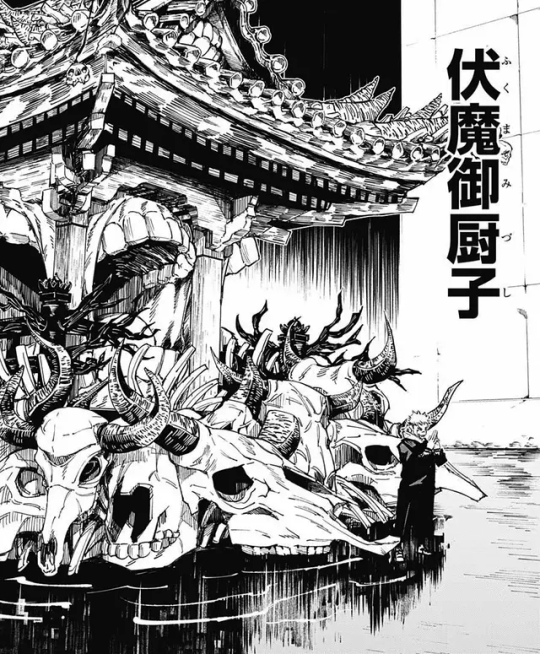
This symbolism also heavily influences Sukuna’s own manner of speech, and the way he speaks to other characters in the series as well. With his post-fight chat with Jogo before his death, Sukuna mentions Jogo lacking the “Hunger” to take control of his desires, preventing him from reaching the heights of Gojo Satoru. Before the Start of their fight in Shinjuku, Sukuna called Gojo a “Nameless Fish on top of his cutting board”, and that he was going to start by “Peeling off the scales”(refering to Gojo’s infinity). There’s also further symbolism that supports this by analyzing the Kanji and meaning of Sukuna’s “Malevolent Shrine” but I’m not very educated on that so I won’t be opening that point here.
What all of this points to is that Eating and Food……is extremely important to Sukuna, to the point that it literally affects him in manners innumerable.
Eating is an instinct, a necessity for the survival of every single living being.
And In the face of extreme Hunger and starvation, even those with the strongest will could lose their Humanity and revert to the basic animalistic side of their existence. (The Heian Period also had a Famine, although I believe the timing to be a bit off, but do with this info as you see fit)
In JJK Chapter 257, it is revealed to us that Sukuna and his Twin were most likely starving in the womb of their starving mother.
On the brink of starvation, Sukuna had to consume his “other self”(his twin), so that he could survive.
Btw, this tweet and this thread gives additional characterisation to Sukuna:

Link to the original thread: Link.
More context (and reactions :P):

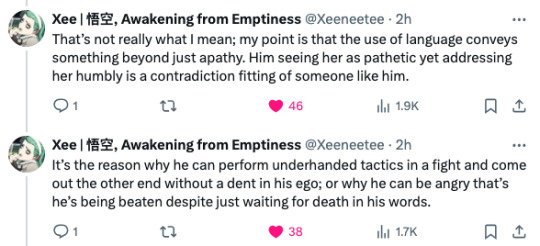
Link to original thread: Here
This reveals to us that indeed, Sukuna was born a twin. And as we all know, “Twins” are seen with extreme scrutiny in Jujutsu Society, they’re not well liked. This too in a period where Cursed Spirits and Jujutsu Sorcery was at its peak, it is not far-fetched to assume that his Mother may not have been treated very well by the people in her surroundings, especially as she bore twins.
When Kashimo asks if Sukuna was born the Strongest or if he made himself the Strongest, this is the response Sukuna gave to him:

When you think about it, how do you think the people around them would have reacted when the woman: who was supposed to birth two twins, gave birth to a single child instead? and that child had consumed his other twin in the womb itself?
No doubt people would’ve been horrified, disgusted and even revulsed. With the woman and her newborn child.
This would’ve led to their further ostracisation in the already very close-minded society. Unable to fend for herself and her newborn child, it must’ve been difficult for Sukuna’s mother to survive. I feel like somewhere along the line, Sukuna was left alone to fend for himself at an extremely young age. To protect himself from both Curses and Society alike.
This is why I believe Sukuna knows what true starvation, weakness and hunger feels like. Both in the emotional and literal sense. He was left without another person caring about him or his well-being, in a cut-throat period where it was “Fight or be killed”.
Powerful curses roamed all across Japan, nowhere was safe. Simply be strong, or you'll die. There's no room for weakness. And initially, a kid!Sukuna was weak, as anyone would be in the beginning when they're just starting out in this world. (and maybe, he didn't have much to eat, leading to long periods of starvation? :') )
I believe it is this debilitating hunger, and feeling of weakness that eventually led to Sukuna’s current Hedonistic mindset.
He’s essentially traumatised by it, and believes that it was his own weakness that led him to experience this sheer starvation. That he deserved to feel this way because he was weak then. Perhaps, the people around him were right, that as long as they have the power and strength to overcome anything, they’re free to do as they please; And there is nothing anyone else could do about it.


I feel like the irony here is that Sukuna himself, must’ve been a “weakling” before eventually rising the ranks to become History’s Strongest Sorcerer. This is also why he values Strength so much.
Ultimately, Sukuna has decided that there was nothing more important than being strong enough to fulfill your own desires. And “eating” is one of his most important desires. It’s his favourite thing to do, the one he derives the most pleasure out of. And like an animal, whose main focus is to consume, consume and consume. He too, simply consumes.
Most morals likely have no meaning to him. He doesn’t care who he hurts, what he does, as long as he’s able to get what he wants. And this isn’t limited to eating.
This is why people referring to Sukuna as a “Natural Disaster” is so befitting of him. Because Natural Disasters also don’t care about what or who they’re destroying, they just come and go, wreaking havoc appropriate for their nature and magnitude.
I believe Sukuna himself has said lines similar in nature, when talking to Kashimo:
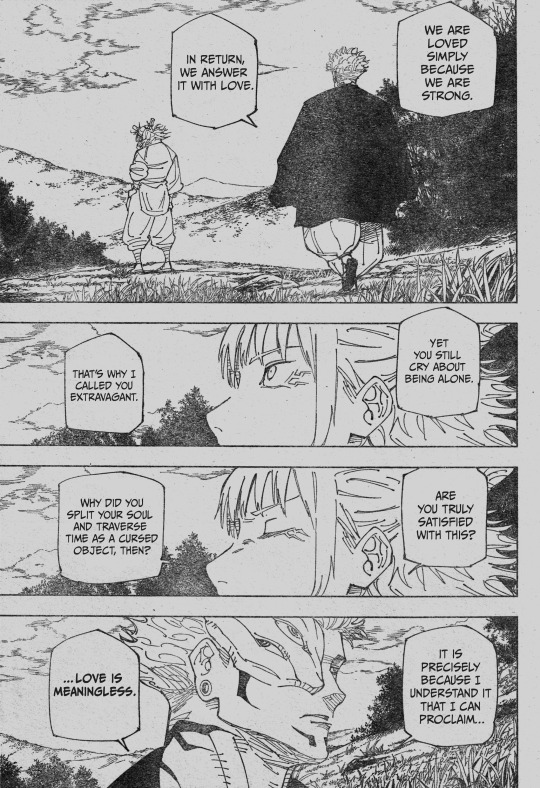
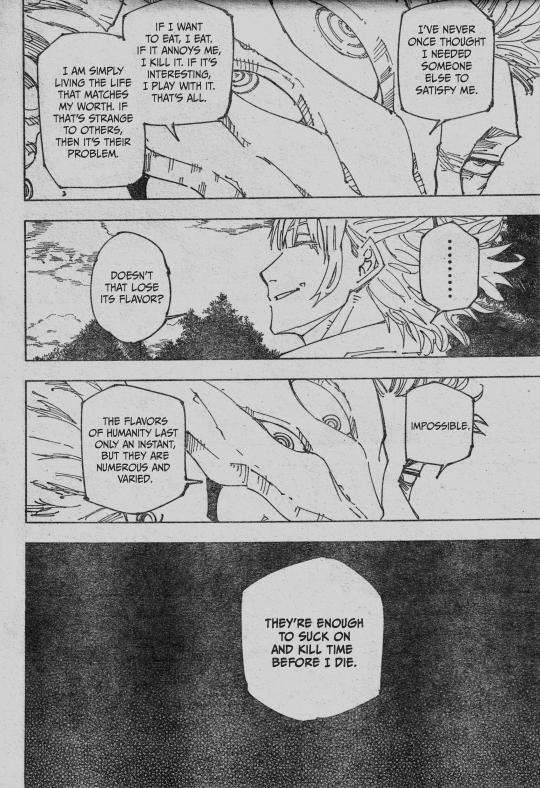
Now I’m not sure how Sukuna perceives or even experiences this “Love”, because I think he has a rather very warped idea of it. I do think that this definition of love is similar to the one that Gojo also understands, but I don’t think he knows what “love” truly is. I’m not sure how I could comment on this, but I do think that Sukuna’s emotionally starved, whether he realises that or not.
Because, like Kashimo himself asked Sukuna “What is the point of dividing your soul into 20 different parts and then traversing across time if you’re satisfied with this?” we do not know the answer to that yet.
But many people have speculated that “Black Box” panels in JJK manga represent a curse (either self-inflicted or put by someone) on the speaker. Like, take a look over here where Sukuna reiterates the same dialogue, except it looks like he’s trying to reassure himself:

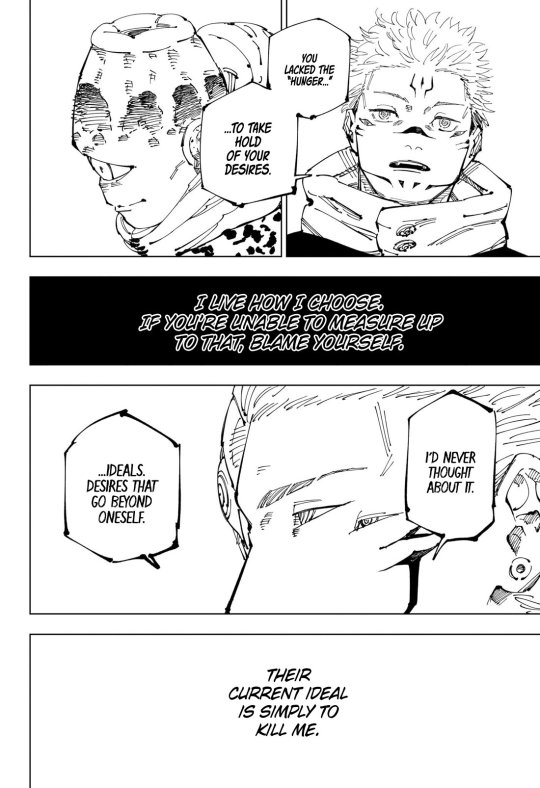
This once again shows that Sukuna has only ever strived for himself, in the same hedonistic fashion, to a very very extreme degree. It is possible that he's been lacking something, and he himself does not realise that he’s lacking it. Maybe it was this subconscious feeling, that led to Sukuna agreeing to Kenjaku’s plan of dividing his soul into 20 different parts, and to traverse across time as a Cursed Object.
Sukuna’s an incredibly complex character, and I’m excited to see where this goes. Gege has put extra care in the way he characterizes and depicts Sukuna, and again, I’m really sad that a lot of that characterization gets lost in translation. Still, I’m going to try my best to understand and get the most accurate feel of his character as I possibly can.
If you made it this far, Thank you for reading! And if you would like, please do leave a comment in the tags or replies because I would love to read what other people think of this and just Sukuna in general. I do not see a lot of people doing critical analysis of him, and a lot of his actions are seemingly swept under the rug. I don’t like that, so hopefully this contributes to people focusing more on Sukuna and his character. (/^v^)/ <3
#ryomen sukuna#jjk sukuna#jjk#jujutsu kaisen#sukuna#king of curses#heian era#character analysis#manga#jjk manga#jjk 257#this is...so very long omg im sorry for my huge word vomit#like 1.4k works but i really did felt like i wanted to gather my scattered thoughts into one place and kind of make the connections#not sure if anyone is gonna read this but if they do#thanks for reading! be sure to let me know what u think!#i just love psycho-analysis of my fav characters and being able to really understand the essence of their characters#their emotions their motivations and to finally be able to do that with Sukuna and reading what everyone else have to say about it ahhh#im super excited! We're finally getting close to the Heian Backlore!! rejoice!!#my gut always did tell me he was a tragic character T_T and now we're finally getting the tid bits#also apologies for adding different panels#but i only added the translations i liked#i don't like J*hn W*rry's translation like yuck#so ima wait for Lightning's translation notes~ for further clarifications!
259 notes
·
View notes
Text
It makes me so sad to think of why people hate Satoru so much, because most of the time (apart from Utahime genuinely just hating him ._.) it has to do with his powers and abilities, not with him as a person.
Yes, his birth tipped the scales and caused curses to grow stronger as a reaction, but that wasn’t his fault. Satoru Gojo as a person is not his powers, they’re just a part of him. Unfortunately, that part of him is the most prevalent part that people see and are quick to judge him off of, so in turn, he tends to over identify with it.

Here when he says “I love everyone but at some point there was a line drawn between me being a person and being a creature” that right there shows how detrimental being the wielder of the Six Eyes and Limitless was to him.
We know Satoru is a loving and caring person. He sticks his neck out constantly to protect the youth and innocence of kids so that they don’t suffer like he did when he was a child & teenager. He tries his best to teach them in the most effective ways he believes to work so that they grow strong. He’s even said he’s not suited to teaching but he does it anyway. Hell, he let the person he cares about most run amok for 10 years because he couldn’t kill him. He has a huge, selfless heart.
But all of that gets overshadowed by the fact that this ability that he didn’t choose to have was thrust upon him at birth.
It’s just so sad because people really don’t see him for who he really is, they just see him for what he is. Living up to impossible expectations is so difficult, even for him who had to deal with it to the very end. He’s told his whole life he’s strong, he starts to believe it to the point where he feels slightly inhuman, and it just causes a sort of reckless abandon with the power he was given.
And it just makes me so sad.
#satoru genuinely has such a huge heart#whenever someone (a character or a fan of the show) says they hate him their main reasoning doesn’t have to do with him#it’s always his powers and the fact that he stands in the way#it’s not his fault though#ugh i will defend him forever#gojo satoru#satoru gojo#gojo#gojo analysis#satoru gojo analysis#jjk#jujutsu kaisen
469 notes
·
View notes
Text


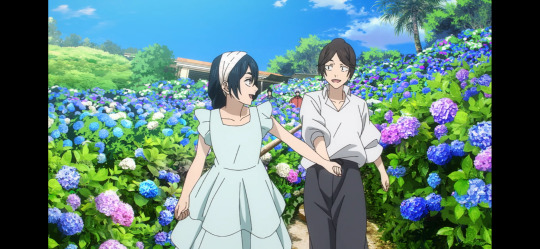
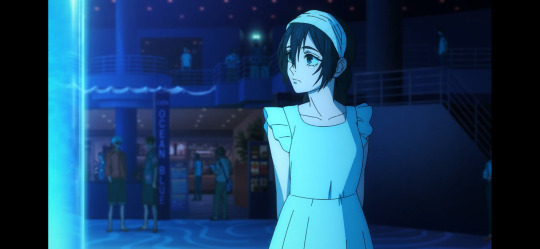
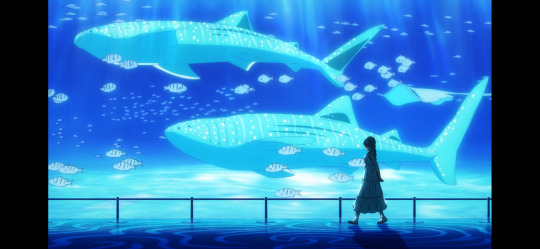
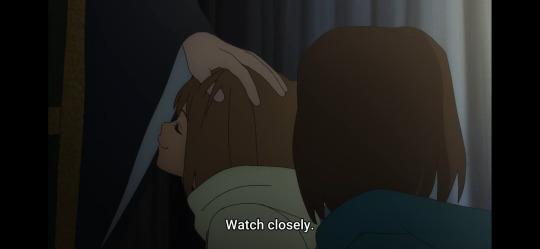


I know I keep analyzing Geto and Gojo in the Hidden Inventory arc but it’s such good writing, like, consider how these two dudes, who never would’ve cared about “babysitting some brat” litterally adopting their own after their split up, all because their time with Rika had an impact on their world views, regarding children.
#character analysis#two great moms#riko amanai#geto suguru#gojo satoru#megumi fushiguro#mimiko and nanako#mimiko hasaba#nanako hasaba#jujutsu kaisen season 2#jjk#lol#good anime#wtf#funny as hell#good manga#dank#anime memes#funny#jujutsu kaisen
198 notes
·
View notes
Text
on nanami
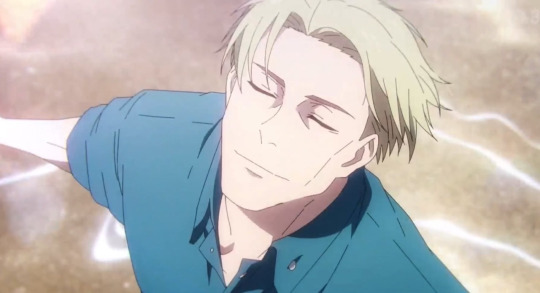
sometimes i forget that a healthy part of the fandom hasn't read the manga, and that nanami's death actually came as a shock to some this week.
which is warranted, given that nanami is one of JJK's better written characters – a rare breath of fresh air, maturity, and warmth in a story that often speed-runs character development.
but i've also seen people bringing up this tweet, expressing a bitterness at gege for killing nanami when he initially intended to let him off with losing an arm:
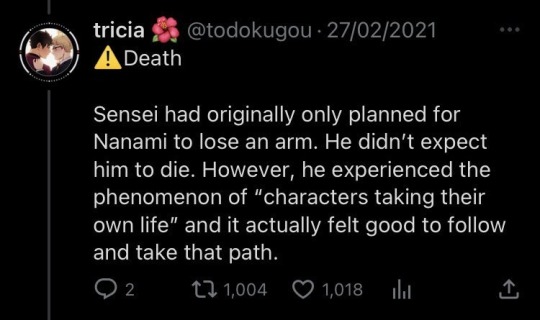
now, don't get me wrong – gege has had his fair share of bad writing moments (more to come in future seasons when we finally get to the culling games and, uhm... you'll see).
what he meant by a "character taking their own life" referred to the natural end of a character's narrative.
nanami was introduced in JJK as an opposite to gojo – he's aloof, he's too serious, and he just wants to knock off work on time. but as we come to know, nanami also has a softer side to him – one that instinctively protects and cares for the young jujutsu sorcerers, as a result of his traumatic past after the death of his best friend.
and in the story, nanami served as yuji's mentor. he defined, for yuji, what it meant to be a sorcerer, and more importantly – a young jujutsushi.
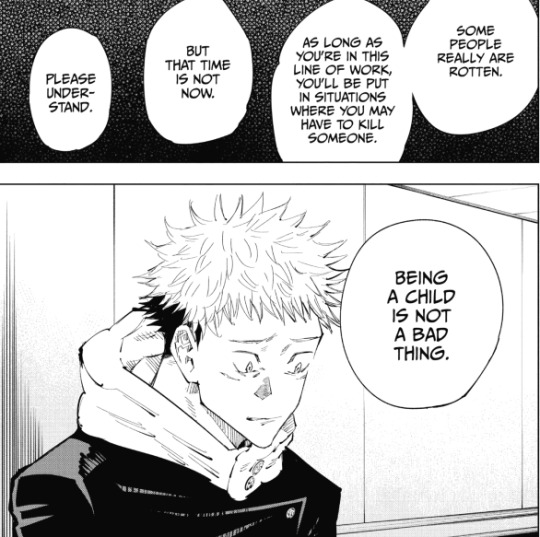
in many ways, he wrote and defined the moral compass that yuji would lean on subsequently in the story.

i wouldn't go as far as to make this post a "why nanami had to die" – but i would also like to make it clear that nanami's role in the story besides being a board-certified dilf™️ is to root both the readers and yuji in the realities of being a jujutsu sorcerer.
and for mahito – his thematic opposite, someone with a complete disregard and disrespect for humanity – to kill nanami, while allowing nanami to pass on his final words to yuji...
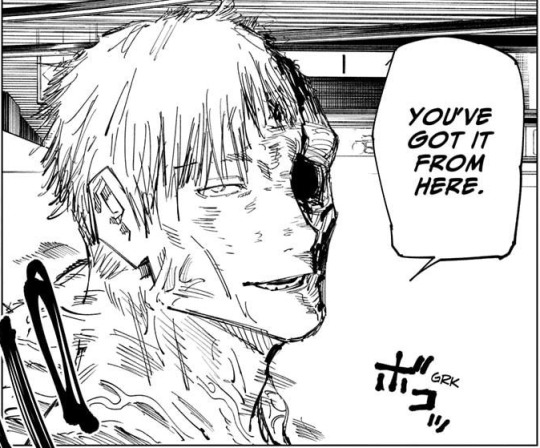
he is not only resolving the conflict he has within himself – because he is able to die with the knowledge that yuji will not be "cursed", that yuji will continue as a jujutsu sorcerer with the right moralities, capable of facing the demons nanami once tried to run away from as a teen.
so, no, gege did not get carried away with killing nanami, as some have opined. nanami's narrative – as a character saddled by the burdens of being a sorcerer, who escaped from his responsibilities as a teen only to return, and to pass them on to a young boy who also has too much to shoulder – simply came to a close. x
#nanami kento#jujutsu kaisen#jjk season 2#nanami kento x reader#nanami kento x you#nanami kento x y/n#jjk meta#jjk analysis#idk these are just my two cents#fandom has a difficult time distinguishing 'idl this because it happens to my fave character' and 'idl this because it's bad writing'#not that only one of those takes is valid but when it comes to levelling crit at a creator we should def separate it from personal feelings
209 notes
·
View notes
Text
Geto was loved even in death.

Wouldn’t it be nice if he were judged by his intentions in the afterlife - wherever that was? He had suffered living with the love he had. We see through the eyes of those left behind, that the ill deeds didn’t define him, as strange as that may be to us as readers in the real human world we live in. Geto’s influence and loving nature were far reaching; Gege certainly made him so treasured by many even after his death. If Gojo was touched by his caring influence, this was also Geto’s will he passed onto his students.
NOT spoiler-free as I’ll be referring to the recent chapter, 255.
I wrote this the other day:
And honestly it’s long enough; here’s part 2.
Is it obvious I’m suffering from brainrot? All my drafts from jjk brainrot are rivalling my thesis/dissertation from way back (lol)
Here is more under the cut:
I’m really moved by the reasons for why Miguel and Larue have decided to join in the risky fight against Sukuna.
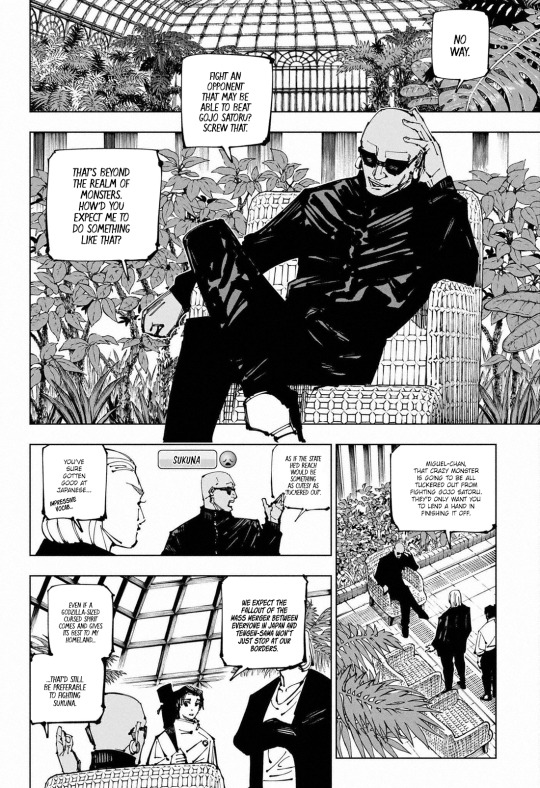
It’s very obvious that Miguel is reluctant at first. He says he he’d rather terrible curses arrive at his shores than to fight with Sukuna, adding that he doesn’t see himself having any ties with Japan any longer.
We can deduce that this was part of Gojo’s plan for the possibility that he dies/loses, and I had a post about this saved in my drafts - but I guess I never got around to finishing it. Basically, in sum, he will achieve giving Geto a cremation (avenging him) and gets to show off to his students (which he does enjoy) by going all out (soo satisfying), and in the worst case scenario, he loses but gets to go all out, weakens Sukuna (for the rest to handle), and idk if he really is that romantic (so it’s really stsg headcanon fantasising) he will die on the same day as Geto.
The Opening theme is rather beautiful in that it interprets Gojo having the words, “we’ll meet again” stuck in his throat, which he doesn’t say. But I’m a bit weird and tend to separate anime from manga. But it’s worth noting that here.
I digress. Back to Miguel and Larue who have moved to speak privately without Yuta.
In a previous post I wondered aloud about what Yuta knew about Geto from others aside from being villainous and I guess this implies he doesn’t know much, since he wasn’t close to Miguel enough to sit around to chat with them. It makes sense.
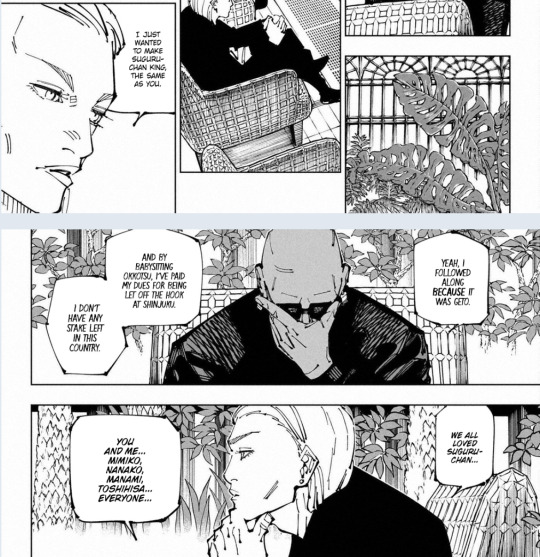
Miguel and Larue both agree they followed Geto in jjk 0 because they wanted to see him become King. What does this even mean, really? Gege, you’re missing stuff out again!
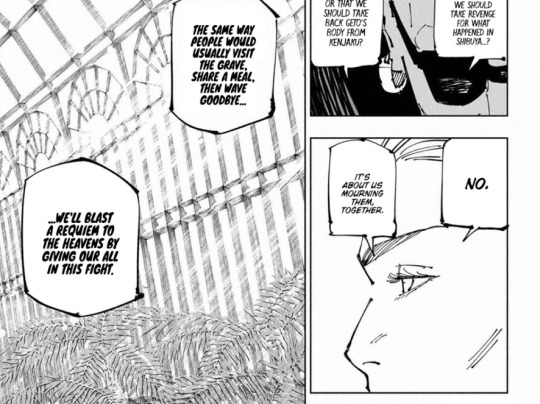
Nevertheless, we understand how reluctant Miguel was. He enquires that Larue intends to do, clarifying: is it for revenge or to take Geto’s body back?
And it seems like their main motivation for putting their lives on the line... is to honour Geto’s memory. Like a traditional ritual one makes for the dead (customary in Japan on death anniversaries - not limited to the year, but also number of days).
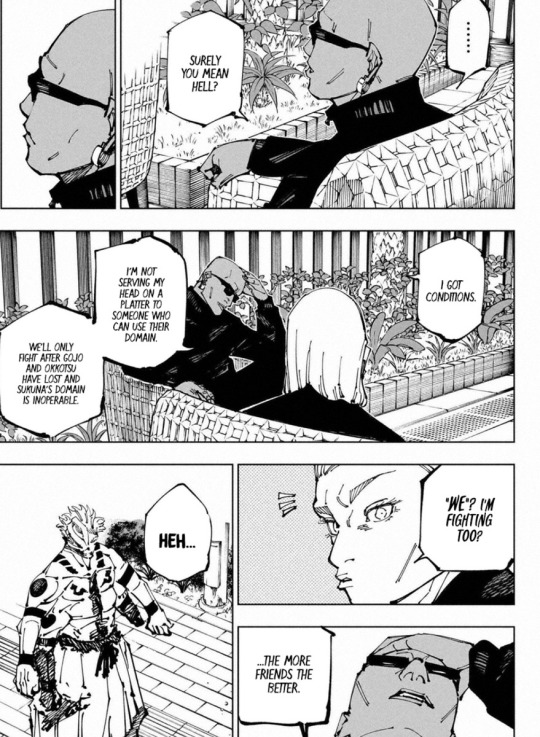
It’s incredibly moving how much they love him. This is actually what led Miguel to reconsider. We see him go silent as he thinks “...” before he reaches a moment of clarity/a decision.
Tbh I have issues with interpreting his statement in between the two panels (re: hell) in Japanese - it doesn’t directly indicate if he is referring to the former part of the conversation (whether he thinks Geto is in hell), or the latter (he thinks the battle will be hell). The phrasing goes like this: “no matter how I think about it: it’s hell.” - I’m not a native speaker so it’s difficult for me to be certain which is right. But the consensus is as translated above. Larue thinks Geto is in heaven, Miguel thinks it’s hell, and we see the airport scene where presumably Haibara and Riko with Kuroi have been there for over a decade. lol. Who knows!
So the bottom line is… regardless of where they think Geto ends up in the afterlife, Miguel is willing to give Geto a send off that’ll even reach hell. Or, despite it going to be hellish, he will do it. It also seems so heartwarming how they still emphasise family and friendship in wanting to fight together - perhaps things we can surmise had meant something to Geto.
They will fight Sukuna because it is for Geto. Geto was so loved that they would risk themselves - not for a title, not for revenge, but out of … love. Again. That’s pretty damn loving. Can we imagine what Geto did and was to them, for them to experience such loyalty and reverence?
Sadly, it goes without saying that Geto’s body being used as a vessel and puppet by Kenjaku has possibly evoked an emotional response by those who cared for him - namely Mimiko and Nanako, and also Gojo. Arguably, even if it were a death without his body being hijacked, Gojo did refuse to cremate his body or have it processed “by the book” of jjk high through Shoko. If that’s not out of a form of love (or “consideration” as Kenjaku put it), I don’t know what is.
The twins went against what Geto wanted for them (to carry out his will) to fight against immensely power beings in hopes they could bring him home. Those were their reasons to fight. Gojo scheduled 24th December - this was after he teleported to Kenjaku immediately upon unsealing so he could bury Geto. We saw Larue and Miguel’s. Toshihisa is alleged to be quite weak, and despite potentially being considered a son to Geto (if his life situation did mimic that of the twins’ - source: jjk character book), he opts to follow the inherited will as prescribed by Geto.
It’s all love. Geto was loved, I’m telling you. I want to shout if off the rooftops because that man just looked so darned sad and deranged after he lost it.
So. Continuing where I left off: Everyone thus far has had a reason to go into battle with Sukuna. I wonder what / who will actually reach him? I hope it’s Yuji ... and that Megumi will react again at some point. They have their own themes relating to love and purpose. I’ll leave them to someone else more familiar with their characters to write about!
And now I’m going offside quite a bit, but it’s still of relevance to Geto and the theme of love that seems to surround him. Way back to jjk 0 and Hidden inventory.
I wanted to just bring this into the picture as well now that I’m already writing a post on that topic, but please feel free to stop if you’re bored now.
So. Jjk 0!
There were direct parallels with Yuta & Rika and Gojo & Geto. This was also confirmed by the director when discussing their vision for the movie. The light novel also drew a link between Geto and Yuta where they were described as being too sincere for this world.
There is a direct theme of love - the type, is open to interpretation.
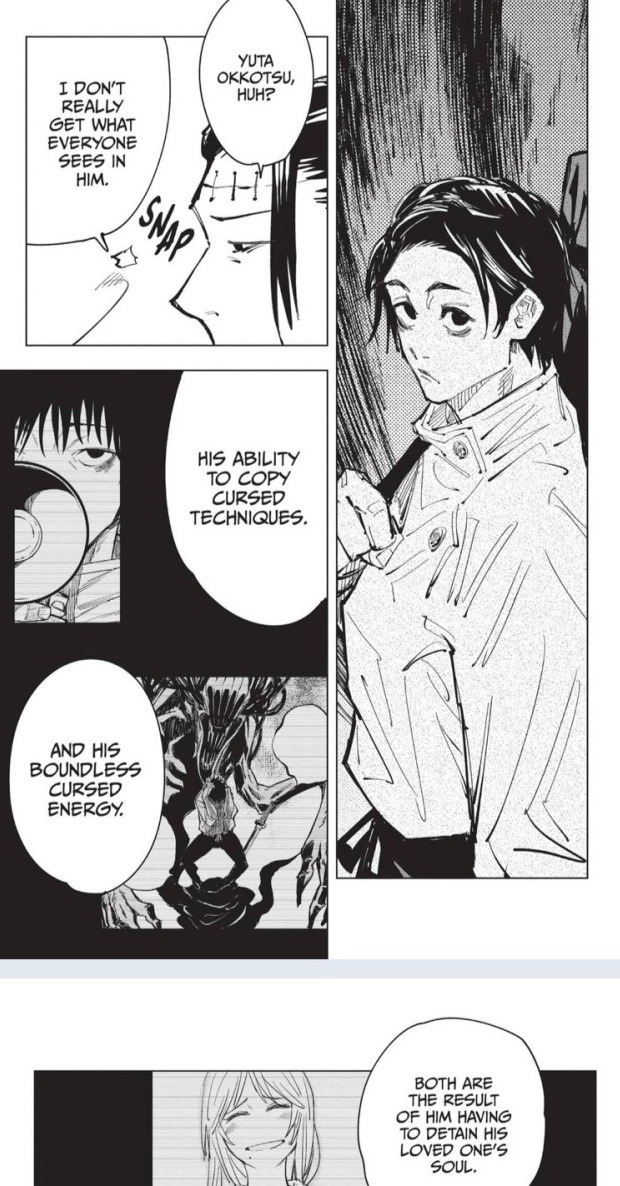
Kenjaku also makes reference to this in the Shibuya arc. So to me, it remains relevant. Love in its many forms is somewhere in what Gege wishes to convey thematically.
Within jjk 0, Geto seemed to pursue power but this was also a symbolism where power = love. It is twisted. In light of recent events, we know that the pursuit of power leads to the dilution and even absence of love. Love that gives birth to power becomes cursed. So it seems.
As we know, Yuta bound his lover to himself to gain power.
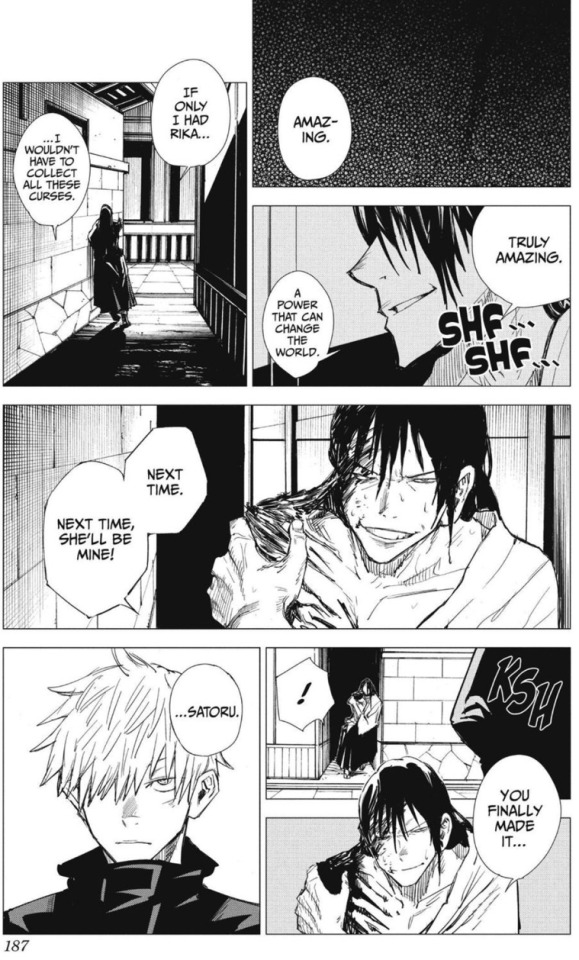
If only he had Rika (metaphor for love: Gojo) he probably wouldn’t have had to skulk around the shadows consuming curses which he hated doing. Geto was lamenting on the past in the above panels. He probably was determined to carry on, as he vouched to give it all he got (Haibara’s last words to him echoing here).
A flashback to the past:

Geto doesn’t do things in half-measures. To avoid hypocrisy, and I headcanon that it was a merciful killing to protect them from him, he kills his parents. To die by his hands than to be used as a pawn to get to him. For them to see the horrors their son could be capable of. It is so very wrong, and we can see the twisted nature of his love in this interpretation.
And Gojo delivers the ultimate blow that leads to Geto reflecting - depicted by the mysterious ellipses “…..” (gege really likes the reader to work hard huh) - insinuating it is impossible for Geto, so don’t even bother trying. The blossoming possibility of discourse was nipped, as the strength differential was implied - you’re the strongest now, whereas it used to be “we”. There was no more place for Geto; it was probably a misunderstanding. Gojo was protecting everyone in his own way, and the only way he knew how.

For power, Gojo was a source - but Geto couldn’t do that in Shinjuku, nor earlier in the arc, when Gojo himself was on the brink of insanity and deferred to Geto about annihilating humans as he held Riko’s dead body. Geto in the scene above acknowledges their different paths they needed to take - Gojo had a place as part of the elite at the school - Geto was already facing an execution order.
And after hearing Gojo’s condescending tone in an emotionally-fuelled attempt to reach out to him. He turns away to protect his friend from himself, and himself from his friend. Anyway, I touched on this in my previous post. Geto feels they had fought and didn’t deserve a place next to Gojo. But deep inside, even his body remembers the sound of Gojo’s voice, reacting to it when called despite his soul no longer being there.
sigh. Moving on... back to jjk 0:
After witnessing the bonds through willingness to sacrifice and the love between these students, Geto was really moved. Gojo trusted Geto retained his sense of humanity / love / idealism - even if it would lead to him sacrificing himself.

He was finding it difficult anyway:
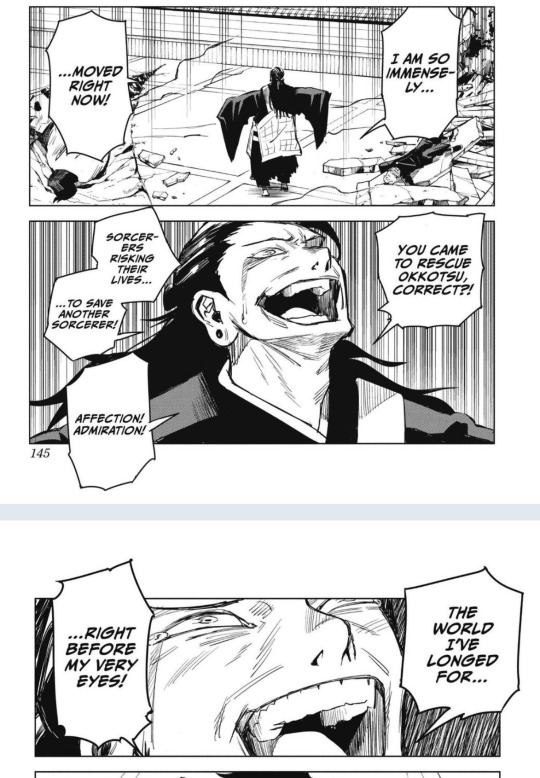

He could always empathise with love. I suspect he tried his best, but the binding vow for Yuta’s life was also just the cherry on top to make Rika super saiyan.
Kenjaku knew Geto probably could’ve won though, had he been more selfish.
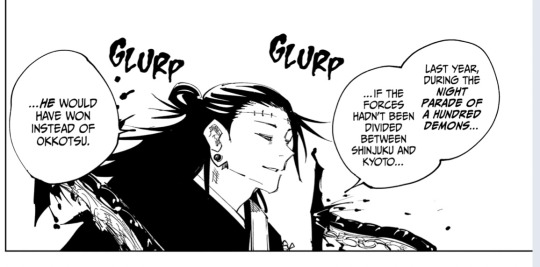
Geto conceded without a fight with Gojo. Maybe it was a matter of trust in that they both knew his living on borrowed time. As the light novel insinuated, this was the only way it could ever end. And Gojo would have to carry the curse that was Geto. This seems... so cruel.
He did his best. He perhaps always wanted the love but set it free.
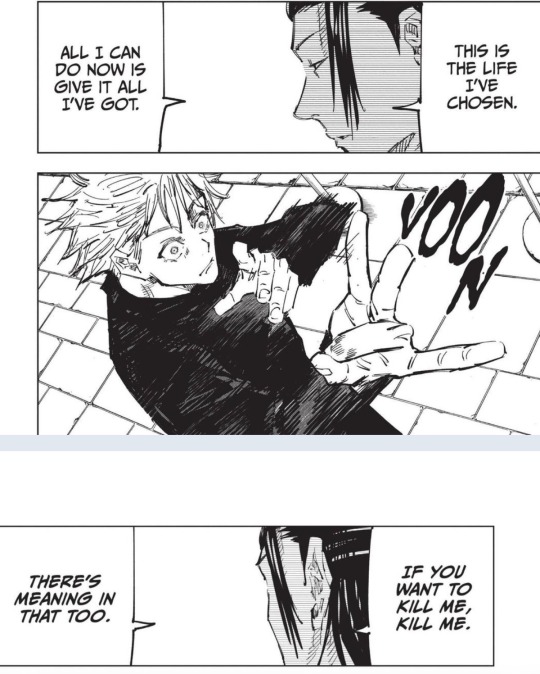
He did so many things for others in spite of himself, in sacrificing himself, in staining himself with blood drenched hands.

Avenging Riko by killing Sonoda. Note how manipulative “humans” are by using Jujutsu rules against them.

He embraces a life of smoke and daggers. Living in lies and half truths in order to live, survive, and find justice in a wicked world.
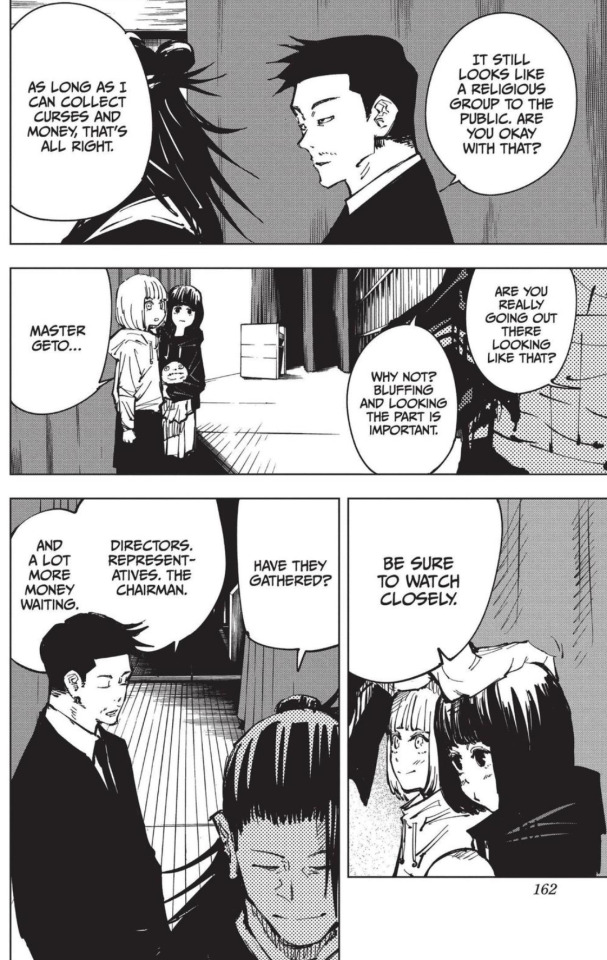
Watch me closely, I’ll protect you, I’ll avenge you, this is how you protect yourself.
This is the path I’ve chosen.
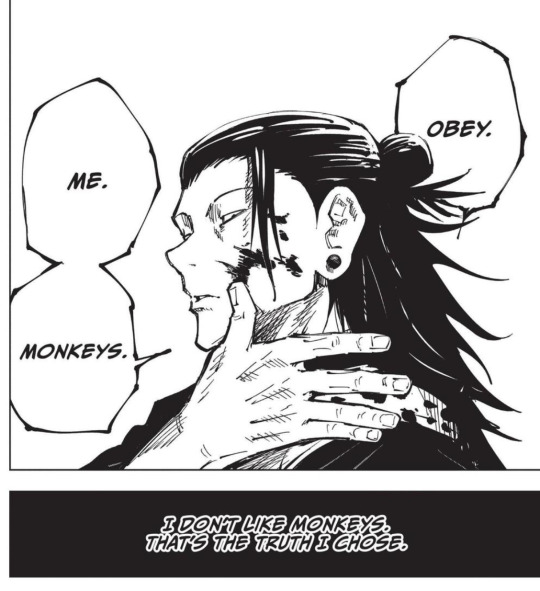
I’m not saying he was right or justifiable. His character is just tragic. The system had set him and others to fail.
The worm foreshadows Geto’s maternal nature. Calling him “okaasan”. I mean, this very worm had a binding vow with Toji. And now it calls for a new owner? I’m not sure if Gege had anything else in mind with this... is the womb protrusion domain Geto’s? But that’s tied to a sorcerer’s soul…. Anyway, I digress again. (Sorry). Geto did have a martyr complex and was written captivatingly well by Gege. The extra touches where how he has been perceived by others and the effect he has (and continues to have) on those we see.
And I just want to leave this heartbreaking thing here:
Source from twitter/now X:
Wouldn’t it be so sweet for Geto to get one (love declaration) at the end of his life, regardless of the way you perceive Gojo and Geto’s relationship?
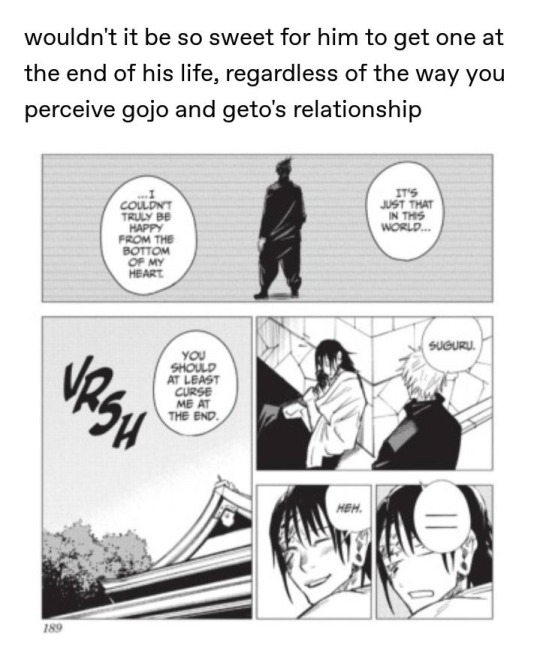
Wouldn’t it be nice for him if he could know that his family who he instructed to flee had all loved him, adored him, and would honour his sacrifice in differing ways...
Instead, a form of love meant his body was desecrated and used by Kenjaku. His girls were killed, and his full potential was not quite realised at all.
If only things were different.
Gojo should have kept him in his basement!
But at least, I think, Gege is giving Geto some love even after his death.
For that I’m thankful.
And thanks for reading if you made it this far with my rambling!
If you want something more light hearted I have a fluffy fic up on AO3 (it isn’t great but i enjoyed writing it to fantasise about what happens at the airport) and if you want more angst and pain, please browse my tags (lol).
#jjk chapter 255#just my interpretation#satosugu#stsg#jjk analysis#jjk spoilers#jujutsu kaisen#gojo satoru#jjk meta#geto suguru#jjk#jujutsu kaisen analysis#jujutsu Kaisen meta#suguru geto#Geto meta#Geto analysis#Geto Suguru analysis#jjk 0#jjk character analysis#jujutsu kaisen character analysis#Geto theories#jjk theories
92 notes
·
View notes
Text
Death Is a Mirror, or How Death Is Linked to the Sense of Self in Jujutsu Kaisen
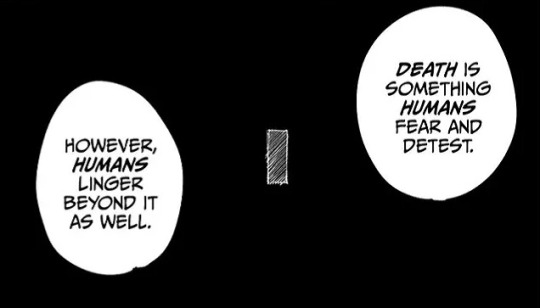
Death is a fulcrum of Jujutsu Kaisen's message, a major point of reference for both the audience and the characters within the story. Death is a mirror that catches and reflects the last light of a life reaching its end, a moment of full disclosure that overcomes all distances and renders all defenses permeable. Death is a mirror as it asks one question: who are we when there's no more need to lie?
The thread that binds together all major characters' deaths in Jujutsu Kaisen is how, despite multiple characters trying in an unreliable-narrator-sort of fashion to convince us otherwise, no one's truly alone in death. The connections that people forge with others throughout their lives become their tethers to the world -- and then reach even further, transcending death itself. This is how humans, using Jogo's words, can still linger after they die: through the loving memory of those they held dear.
No human exists in a vacuum. We live in the context of our relationships with the world, of getting to know and getting to be known in return. Our lives, in a sense, are a dialogue -- that's why we give and are given names. We shape the images of ourselves through establishing connections with others; our self-recognition and sense of self come from recognizing those connections. Once again, we learn the outllines of our souls by bumping into others.
These two concepts, recollecting your 'tethers' before death and acquiring self-reflection in others, are consistently brought together in the story. Before everything else, it's reflected in Yuuji's (who the story's focal point as its protagonist) idea of a meaningful death, one gone surrounded by those you love. Nobara, who possesses arguably the strongest sense of self with her loud proclamation 'I'm Nobara Kugisaki!' and who's highly conscious about her relationships with other people. Megumi, whose overarching struggle for self-determination has him relying on others to define his own worth and leaves him passively suicidal. Toji, who in his last moments thinks about his family and understands that by leaving them behind he deviated from his true self. Nanami, whose fading mind conjures the image of his closest friend and who, guided by that, chooses to go south and stay true to himself. Kokichi is yet another example, and actually quite an interesting one. His character is explored primarily through the juxtaposition between the concept of 'the body within the world' and his forced isolation, but who still contextualizes the world through his connections with his friends. It's no coincidence that Kokichi's character arc is closely linked to Mahito, who is dubbed a mirror of death.
In short, there's a plethora of instances where death and one's sense of self are tied to one another like that. I'll ramble a bit about how this correlation is discovered in both Gojo and Geto's characters below the cut.
The lack of self
Gojo is somebody who's essentially lacking both connections to others and a sense of self-identity. His entire personality is shaped around the notion that he's The Strongest, the very thing which prevents him, even if in his own mind, from building meaningful relationships with the people around him.
Not having to challenge or change his self-image, Gojo has little to no recognition of himself as a person outside of his title. He has never faced a need to discover himself in relation to the world; he was given a foundation to construct his identity on upon birth. Did he really need to grow past that and redefine himself? Satoru lacks self-reflection -- most literally.

With Gojo's face obscured by the gaping void, we do not get to see his reflection. I'd say it's quite an apt visualization of Gojo's identity crisis. Who are you if not The Strongest? As Gojo's position is challenged with his Infinity suddenly overcome, this question is forced onto him.
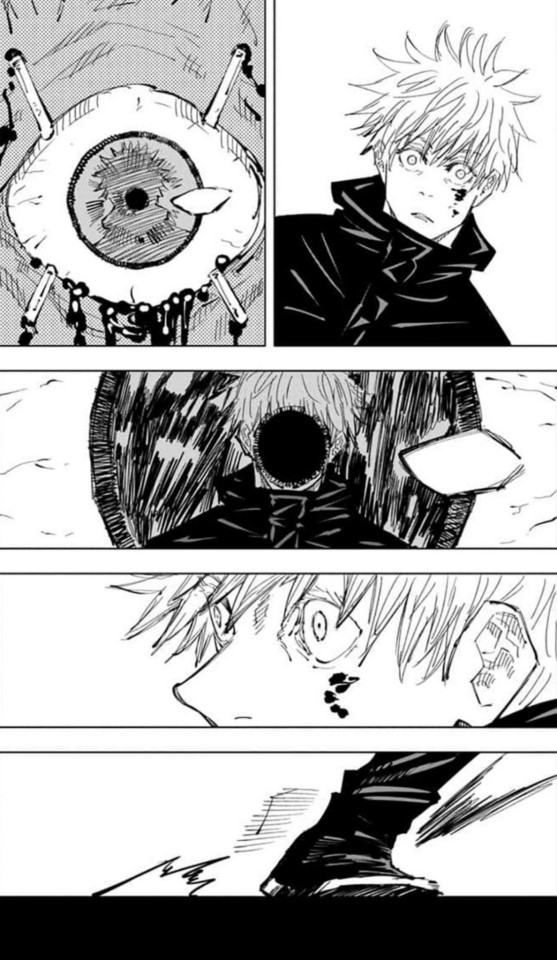
But as he's spent over a decade trying to escape answering it, he never got a chance to acquire a definitive answer. So now, in Shibuya, he flees from it once more.
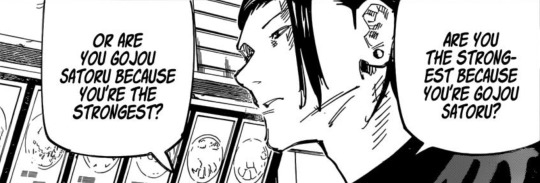
It's painfully ironic and at the same time fully logical that it is Geto who exposes this issue to Satoru as Gojo's sense of self is arguably connected to him more than anyone else. During their student years Suguru was the one who persistently rejected treating Gojo as a title and not a person, who looked through decorum and actively chose to see him not as Gojo Satoru, The Strongest but rather as Gojo Satoru, a teenage boy. For Gojo, it was through Geto recognizing him as a person that he was able to reach that recognition, too.
But after Toji Gojo is forced to seek self-affirmation and validate his ego by reclaiming his position, which was threatened by him losing to somebody for the first time. He tries to reinforce his self-image by separating himself from the world, which ultimately leads not only to his now automatic Infinity rendering him unreachable (= disconnected), but also to a loss of his sense of self as he loses his one and only connection.
As I've already said, with the Prison Realm breaching the defenses of Gojo's technique, this issue, his lack of a firm sense of identity beyond his title, is exposed to him once more. It's reflected in the way Satoru places his priorities post-unsealing. He fights Sukuna with seemingly a single purpose of cementing his position as the strongest sorcerer alive and thus regaining his uderstanding of who he is. The answer to this question has never lain in the plane of strength alone, though, and that is why Satoru fails utterly.
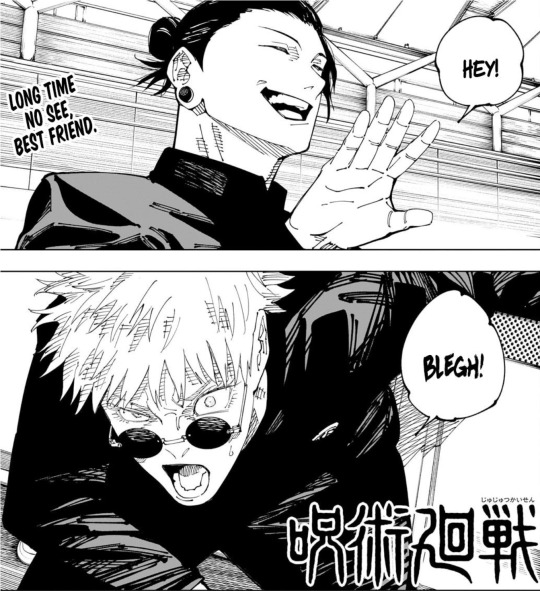
But in death, as the relevance of his Infinity is eliminated, Gojo is finally able to reconnect with his sense of self. He's reverted to his teenage self, to the time he could still relate to somebody on a personal level and get stronger for it. The entirety of the 236 chapter, in a sense, is written as an affirmative: he is The Strongest because he is Satoru Gojo, not the opposite, but it's his death which makes him finally recognize this.
The deviation from self
Now, this image could not be intended as a visual parallel to Gojo's reflection, or lack of thereof, in the Prison Realm's eye. Nonetheless seeing that scene in Shibuya animated immediately reminded me of it, and I think there potentially might be some thematic similarities between the two as well.
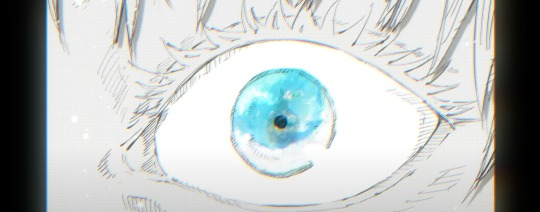
Talking about how our identities are defined by our connections to other people as much as our relationship with ourselves, it'd be only logical to assume that Geto should have a firm grasp on who he is. Not only is he a deeply self-reflective character, but also one who actively relates to others.
However, Geto's reflection in Gojo's eyes is unclear and uncertain, almost indistinguishable. It might be a neat way to convey how, finally taking a moment to look at his best friend for the first time since SPVI, Gojo doesn't really recognize him for how much he's changed. But it also could hint at how Geto, driven to the point where he bends and warps his beliefs to justify his actions, also bends and warps his sense of self.
At least how I see it, the image above calls to mind this panel:

The moment Geto tells Satoru he's decided on 'his true feelings' which would define him as a person. Isn't it ironic how in the exact same conversation he talks about how the goal he's settled upon is only possible for Gojo, meaning striving to achieve it would be akin to trying to become someone he's not? The light novel outright tells us as much:
This was the final confession of a man who could only choose to warp himself, who had erased himself in pursuit of his goals. The only person who could bear such a curse was Gojo Satoru.
In this light it's interesting how Gojo's struggle with his sense of self makes itself known through something which threatens his position as The Strongest, whereas Geto's is reflected in the eyes of someone to whom he refers while saying 'If I could become you...', deviating from himself.
A major factor of overcoming trauma is embracing the inadequacy of what happened. So, to a certain extent, by becoming an enemy to the system Suguru wants to prove the world of jujutsu sorcerers wrong and himself -- right. It once again reminds me of Toji's dying thoughts.
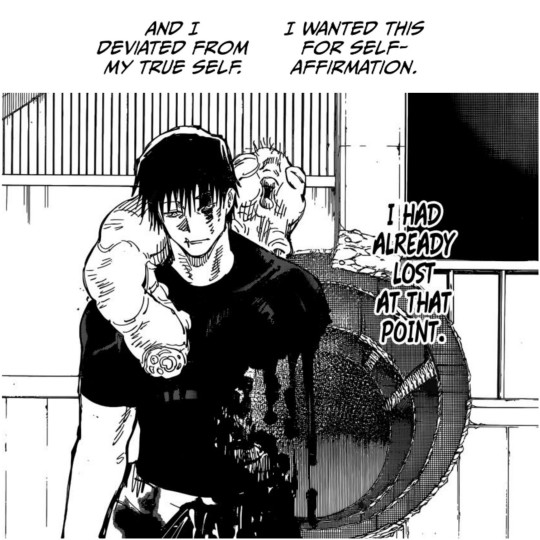
The flip side of 'deciding on your true feelings' is ultimately anchoring your entire identity to what is just a single aspect of it. People exist in motion, and our personalities are in actuality as dynamic and complex as our relationships. But Geto bound his self-definition to what was rather simply a reactive feeling, so in the end he inevitably failed to live up to it.
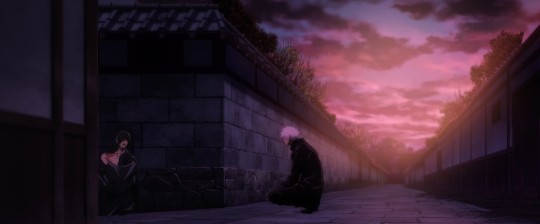
And once again, it's exposed at the moment of Suguru's death. In his case, though, this failure is also what leads to his defeat and consequent death in the first place. I also find it curious how Geto's face is the first thing Gojo sees in the afterlife, while Gojo's face is the last thing Geto sees and acknowledges in his life. And just like Gojo, in his last moments Suguru reminisces about their shared past.
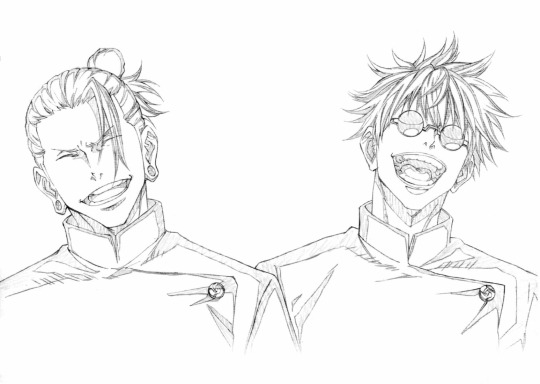
The image almost mirrors what we saw in the chapter 236, suggesting how Geto's true self is in turn tied to Satoru. Despite how vague and uncertain their relationship's come to be, the two are rendered inseperable even in death -- or rather, in death especially.
#jjk#jujutsu kaisen#jjk analysis#jjk meta#god i don't know which characters to tag and in what order#gojo satoru#geto suguru#satosugu#yuuji itadori#nobara kugisaki#megumi fushiguro#toji fushiguro#nanami kento#kokichi muta#mahito#there are too many of them it doesn't feel right to tag them all somehow?#i was trying to keep it short but it obviously got out of hand#*sighs in frustration*#something something you'd say you love me and look in my eyes but i know through mine#you were looking in yours#but not in a derogatory way!#it's all about connections! it's all about tethering! it's about learning who you are through the people around you#we are maps of our experiences and we carry with us everyone we met along the way and let in#that is the gist#jjk manga spoilers#probably should include this tag too#actually not a fan of how pretty much everything i write eventually turns into a satosugu post#but what would you do i guess#*sighs in frustration once more*
221 notes
·
View notes
Note
"Are you the strongest because you are gojo satoru or are you gojo saturo because you are the strongest?" I never understood why geto said that to gojo, can you explain to me? Did he want to give gojo a reality check?

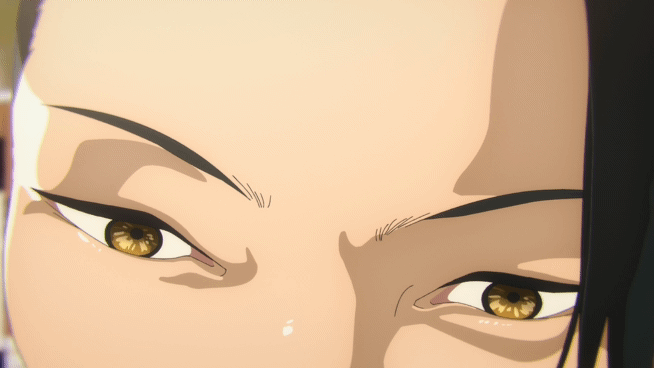
Obviously, just my opinion, but I think this was a really subtle way for Geto to burn the bridge between he and Gojo.
Part of what made them equals and, I think, what really endeared Geto to Gojo was the idea that they understood one another. Geto, an outsider, probably didn't know Gojo for the reputation and prestige that typically preceded him. As a normal person with a general sense of compassion, he probably never conflated Gojo with his Limitless or his Six Eyes technique. It's why we see Geto concerned that Gojo is wearing himself down in Okinawa. It's why we see Geto thank Gojo for his hard work in protecting the Star Plasma Vessel. It's why we see Geto immediately spring into action when Toji gets the jump on Gojo.
Geto is aware that even the strongest have weaknesses. Where Gojo is seen as an infallible solution to whatever the elders can't handle, Geto recognizes that even Gojo has limits.
I do think that, within the events of what inspired Geto's defection, that Geto grew bitter or resentful toward Gojo's power, in a sense. Even if he could hide his spiral, it's kind of crazy to think that Gojo with his infinite wisdom couldn't see that he was falling apart but I think we're also over assuming how much time they had together when they were sent on more and more solo missions to deal with the aggressive spawn of curses following Gojo's latent power up. Even so, the basis of their intimacy was a reciprocal understanding of one another, their shared burden in being the strongest. But Geto was struggling and Gojo wasn't there. Gojo became the strongest and Geto realized that, with the limits of his own strength, he'd never be able to meaningfully manifest change in the broken system that would allow the casualties he'd suffered.
In the scene where Geto cuts ties with Jujutsu High and, by extension Gojo, Gojo asked him to explain himself. For one, Geto had been his moral compass for so long and he couldn't reconcile this break in character. But, on a lesser note, I also think that Gojo, at any point in time, would have forgiven and accepted Geto. After all, Gojo had the strength to forge a world where Geto's transgressions could be forgiven. But when Gojo points out that Geto should not pursue something so fruitless, so impossible, Geto acknowledges that it wouldn't seem so impossible if the roles were reversed. The question challenges the notion that Geto could always see Satoru beyond his power. In that moment, he seems to abdicate his place as The Strongest, as someone who understands Satoru in favor of being just like everyone else, effectively shutting a door between them which I believe was the point.
We realize several times over that even those words, as said in anger and/or malice, never changed the way that Gojo saw Geto. But in Geto's mind, that was it, likely as intended.
#neon asks#anon asks#we are the strongest#manga with me#manga with me jjk#satosugu#stsg#gojo satoru#satoru gojo#geto suguru#suguru geto#anime#manga#jjk#jujutsu kaisen#jjk character analysis#jjk meta#jjk analysis
112 notes
·
View notes
Text
JJK Character Analysis (kinda)
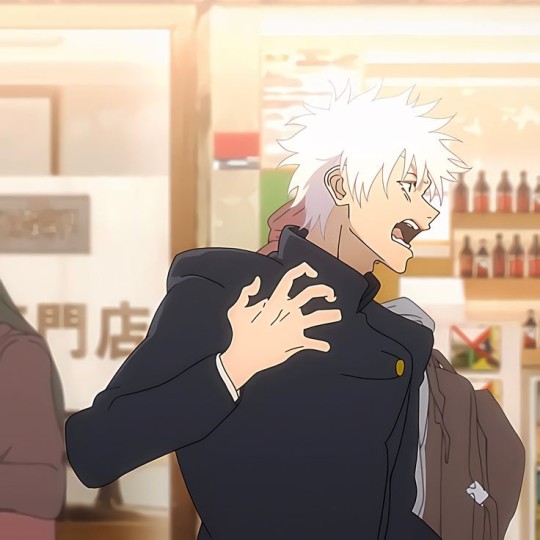
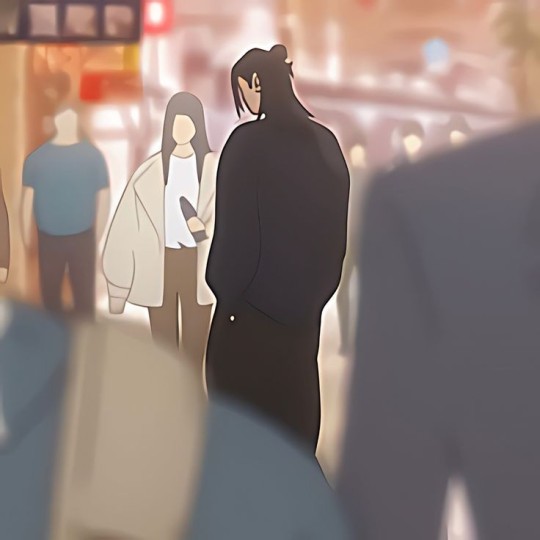
Topic: "Gojo knows it's his fault that Geto left."
When I first entered the fandom I grew really tired, really quick of this statement. Bc it's just wrong.
Gojo may THINK that he is at fault for Geto leaving, but it's simply not true. They both fucked up big time communication wise. Still, I think the way things went between them was really realistic and could have happened just like that in real life.
I'm gonna ramble now, so either buckle up or scroll.
The obvious point where their relationship started to fall apart was defenitely Riko's assassination. Let's start from here. I'm gonna switch between Gojo and Geto, I hope I can word my thoughts correctly.
So, our boys both responded differently to the incident.
Let's take a look at Gojo first.

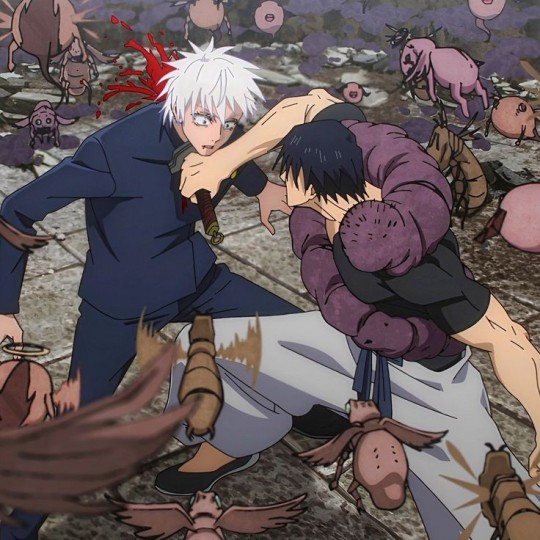
We see him get stabbed from behind by Toji and he doesn't even flinch. He just smiles at Suguru and tells him to get away. This moment alone shows how strong the mask Gojo puts on is, and for me, it really doesn't come as a suprise that he later seems unaffected by the events of the day.
He locks it away. He doesn't show anything. Gojo is the Strongest and not allowed to show any kind of weaknes.
That's basically what he was taught his whole life from society and probably his own family/clan too. So, he acts accordingly, bc he actually believes he has to. He smiles through the pain.
Now to Geto.
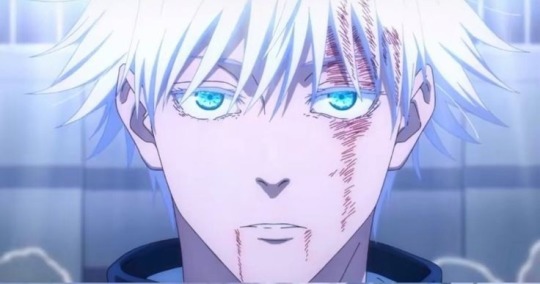
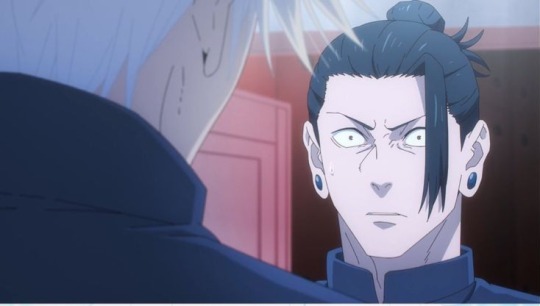
I started to sum up what happened to him during the incident, but let's be honest we all know what went down and don't need it. So, I'm gonna sum up.
Humans clapping applause over the death of an innocent girl. His best friend holding said girl, a numb expression on his face that Suguru had never seen on him before.
"Satoru, is that you?"
His whole view of the world basically tips and shatters.
Humans, in his eyes, are no longer worth protecting. His best friend's hands are tied by the fucked up Jujutsu Society, forced to keep fighting and fixing until one day he can't do it anymore.
His whole world basically turns upside down, nothing is like it was before. And what is even more frustrating, Suguru doesn't have the power to change it.
Satoru has. But Satoru won't. He acts like nothing happened. Satoru just moved on. (He thinks.)
But Suguru can't do that. This sense of injustice eats him up inside and he can't fight it.
Sooo, now that we got that established, let's look at the miscommunication!
Geto is depressed. Obviously.
He keeps his thoughts to himself, bc he doesn't want to burden his friends. And also (I think) bc it's hard to pin down what he is actually feeling in the beginning. He doesn't quite get it himself, so what is he supposed to tell them?
He isolates himself, allowing his spiraling thoughts to grow and take over his mind.
It's typical depressive behavior. Closing yourself off and marinating in your own misery until those dark thoughts blow up and become all consuming and suffocating.
You can't tell a depressed person to talk, to 'just open up'. The automatic response is to become defensive and close up even more. You can only offer a helping hand. The person has to take it theirself.
"Suguru, did you lose weight?"
Satoru tries. He offeres Geto a hearing ear. Agreed, not in the best way there is, his voice too cheery, smile still on his face, downplaying the situation.
He simply doesn't know how to deal with this new version of his best friend. He doesn't know how to pull him out of it. For that Gojo would need to open up himself, show that he is struggleing too, but that's against everything he's ever been taught. He doesn't know how, and he probably is hella scared of his own feelings, hiding them even from himself.
"It's just the heat stress."
Suguru pushes him away, locks him out, bc there is already enough pressure on Satoru's shoulders. At least so he thinks.
And mayyyybe Suguru even has some subconscious repulsion against him. Gojo has all the power to chnage something, but he doesn’t. Geto has the vision to change something, but he can't. He's not strong enough.
They are both helpless. They don't know how to reach out to each other.
Another point: We only get Geto's pov. of the aftermath. We only get to see him deal with the fallout.
So we as the viewer know that he isn't doing well, that he is spiraling and in desperate need of help. It's easy to point fingers and say "Look at the shadows beneath his eyes. How didn't Gojo notice?"
Gojo did notice. He just didn't know how to reach out. He never had to deal with something like that before.
And now what bothers me the most: Who was there to look after Gojo? Who did offer him any help? If people point fingers at him, why not also at Suguru?
Yes, it was more obvious with Geto, he didn't have the same mask in place. But what friend wouldn't at least ask if things were okay, after their best friend literally got sliced in half and just barely escaped death?
I'm not trying to blame either of them. They simply were both too caught up inside their own minds. They were dealing with their stuff on their own and failed to see the other struggle just as much.
This isn't a one way thing. If anything, they both failed each other.
"Gojo knows it is his fault that Geto left."
No. Just no.
Bc really, in the end it's nobodies fault but Geto's. Yes, he struggled. Yes, he was traumatized. I get his character, I really do and I understand why things ended this way. But I just hate to see all of his flaws getting looked over and pushed onto Gojo.
Like a hug would have fixed things.
It doesn't work like that. Suguru's decisions were solely his own. He decided to push Satoru away. He decided to isolate himself. (Again, typical behavior of a depressed person and likeley to happen subconsciously). He decided to wipe out an entire village of 'innocent' humans.
Don't get me wrong, I love our Monkey Anti, but I'm not going to defend him. He fucked up. He had his reasons, but still.
Like Gojo said later on: "You can only safe someone who is already waiting to be saved."
Geto did not want to be saved. Or at least he didn't give Satoru a chance to save him.
So no, it's not Gojo's fault, even if he himself thinks so. Of course things could have ended differently, but for that both of them would have needed to open up.
Their falling apart was really well executed in the story. They didn't know how to deal with the situation, so they kept silent until it was too late. It's really human of both of them.
(Honestly, if you wanna blame anyone for anything, blame Toji. We wouldn't even have this mess if it wasn't for him.)
Phew... I still feel like I have so much more to say. I hope I brought my thoughts across.
I just think it's really sad that Satoru's pain and struggle get's overlooked so much, just bc we didn't see it on screen. But then again that's really fitting for his character. "The strongest doesn't struggle."
Cleverly written Gege. It breaks my heart every time I think about it.
+
These are my thoughts on the topic. If yours differ that's totally fine. So, our brains don't work the same. No biggie. Pls don't come at me.🤍🖤
#jjk spoilers#jjk#character analysis#satosugu#I tagged this bc I'm a shipper💪#jujutsu gojo#gojo satoru#getou suguru#suguru geto#satoru gojo#fc breakup#idk#jujutsu kaisen
72 notes
·
View notes
Text
Okie okie I want to talk about Gojo's 'obsession',
(because the way he's attached to people is sort of how I get attached to people)
I think Geto's his comfort person. The person he feels most like himself around. Everyone told him he was 'the strongest' since he was little.
But Geto? Geto's as strong as Gojo is in the Hidden inventory arc. Here's something that isolated him from everyone else, and here's another person who shares that with him. (Not only that but has a moral structure to deal with it. And I think Gojo got to put all of the 'strongest responsibilities' onto Geto - who didn't mind it - and it left Gojo to be himself. AND this person does not mind Gojo's love language being teasing.)
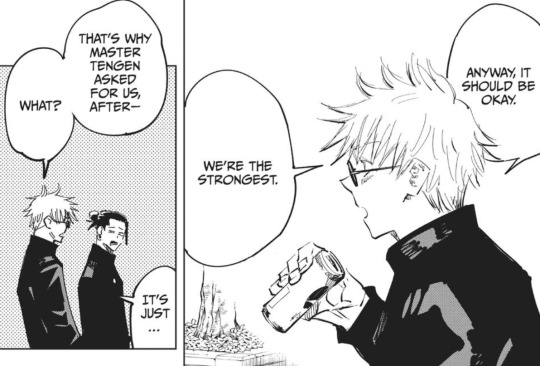
AND Geto's more perceptive to how others feel (empathetic) whereas Gojo is more compassionate, and will do things that he thinks others would like (Itadori trains by watching movies, teasing Utahime and Gojo thinks her being angry is a joke, saving Itadori for Fushiguro)
Riko is a good example. Gojo's priority was making sure the two groups didn't kill Riko, and at first following Riko's wishes was an unnecessary danger ('being soft on her).
But then there's this:


ANd it's my theory that the reason he tried so hard to let Riko enjoy herself at the beach is because Geto pointed this out. I don't think the thought even occurred to Gojo beforehand.
Also there's this:
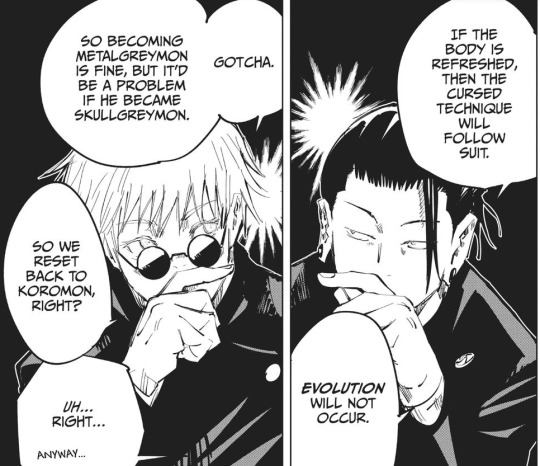
And this:


And this time where Gojo directly asks:

Gojo did not think of himself as rude. Teasing others is literally how he thinks bonding works and for some weird reason only Geto likes him for it.
BUt yea! Gojo depends on Geto for all of Geto's ~perceptive skills and general knowledge and... everything really~ And Geto's not mean about it! At all! HE"S SO NICE THE CINNAMON ROLL
And while we're on a satosugu ramble...
Gojo is a strategist (my headcannon is that video games/digimon made him very good at it) and he uses that to make sure that Geto doesn't blame himself.
As seen here:


ANd here:

In this scene in particular, Gojo takes the blame for Geto so that Geto doesn't blame himself (instead he blames monkeys... guess that didn't work out.)
... and this ended up being a 'Satosugu and how they support each other' ramble...
Oh and while we're here, this is a post about Gojo being a strategist
And this post is more of me going crazy over Satosugu
#satosugu#gojo satoru#jjk satoru#satorugojo#geto suguru#character analysis#jjk geto#jujutsu geto#satoru#suguru#jujutsu gojo#jujutsu kaisen#jjk#jjk gojo#satoru gojo
96 notes
·
View notes